Path of Exile 2 Reveal Megapost
Path of Exile 2 news has been scarce since Exilecon 2023 but in today's Livestream GGG revealed a ton of new information about the lore, classes, ascendancies, trials, crafting, endgame loop (league mechanics, atlas progression), crafting, and more! This is the largest Path of Exile 2 reveal to date and absolutely packed to the brim with information, so without further ado let's dive in.
PoE 2 Setting and Lore
The game opens on a grimdark scene, 20 years after the events from Path of Exile's story. A series of adventurers are venturing out into the woods to deal with some unknown horrors. But soon enough, they are claimed by the creatures lurking in the darkness, being picked off one by one.
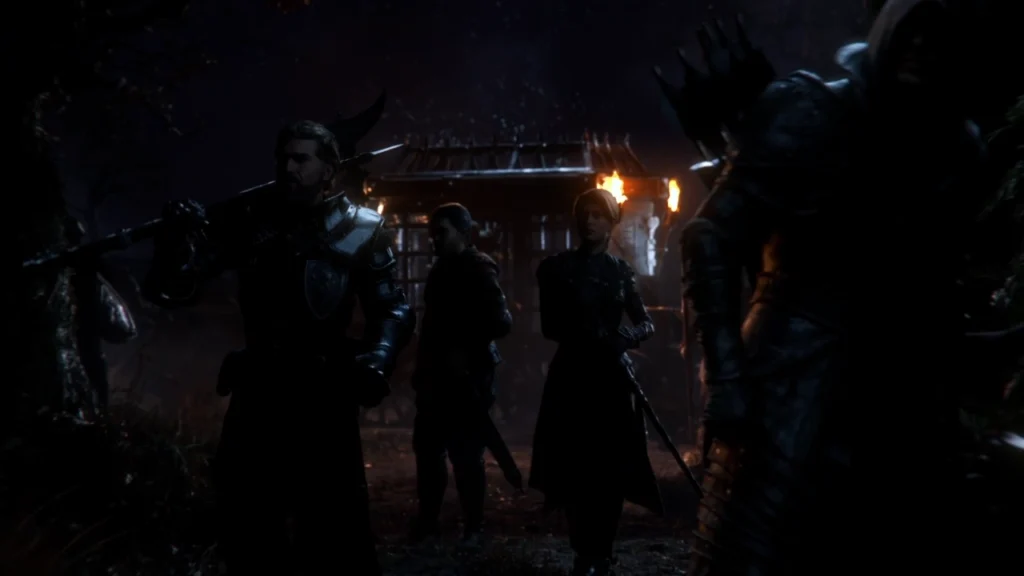
Major Characters
This is where the Hooded One comes in. A mysterious immortal being who you meet in the game's first Act. We know very little about this creature, save that he may be a remnant of a lost ancient civilization, possibly the one whose primordial ruins we explored while delving deep into the darkness.
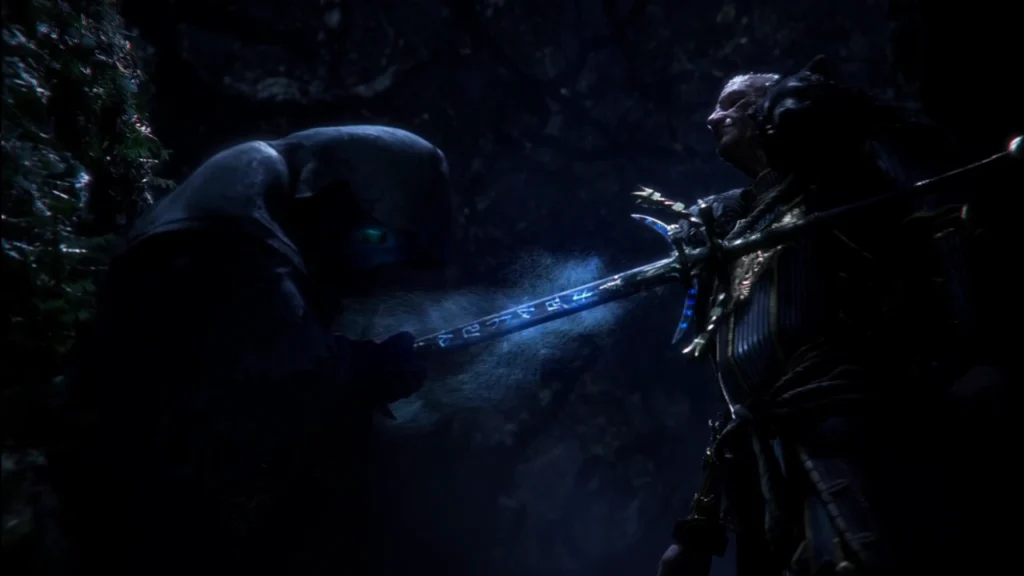
During the opening cutscene, we also meet Act 1's villain, the Iron Count. He carries the Seed of Corruption which contains the remnants of the Beast. An ancient and powerful entity responsible for spreading corruption across Wraeclast. It was the beast who whispered within Malachai's nightmares and fueled some of the Vaal Empire's most perverse thaumaturgy. The Iron Count wishes to unleash this corruption and harness it to his own ends.
The Campaign
This is where you come in, Path of Exile 2's campaign opens on an execution with you (and any of your party members) being the sole survivor. From here you fight enemies, obtain powerful skill gems, craft new gear, and take down 50 unique bosses as you go through Path of Exile 2's campaign.
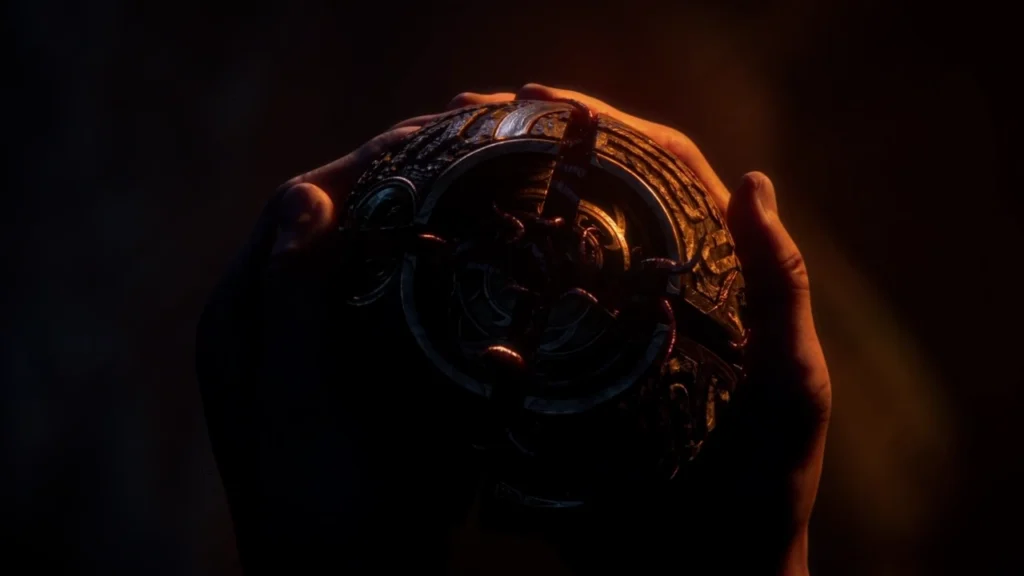
- Follow the story of Ogham and confront the Iron Count
- Then explore the Vastiri Desert
- Before journeying into the deep jungle of the Utzaal Ruins
After you fight your way through Acts 1 through 3, you do it all again on Cruel. This is a placeholder for the game's 4th, 5th and 6th Acts which aren't part of the early access. Then it's time to enter the Atlas of Worlds and explore Path of Exile 2's deep endgame (which is covered later on in the reveal)!
Classes and Ascendancies
Path of Exile 2 has 12 playable classes, but the reveal confirmed only 6 of them are available for the early access. These are the Monk, Warrior, Ranger, Mercenary, Witch, and the Sorceress. During the campaign, you get to specialize your class by completing the Trials of Ascension. On release each class will have 3 ascendancy options, supporting a wide variety of playstyles and archetypes but for early access you only have 2 options. But 12 class/ascendancy combinations still gives you a lot of options so let's get into what's on offer!
The Class and Ascendancy section is written based on the recommended weapons for each class. However, once you reach endgame you can use any weapon and any skill on any class or ascendancy. Want to be a 2h mace wielding Mercenary? That's totally fine. Planning to use elemental spells on your Deadeye, go wild!
Warrior
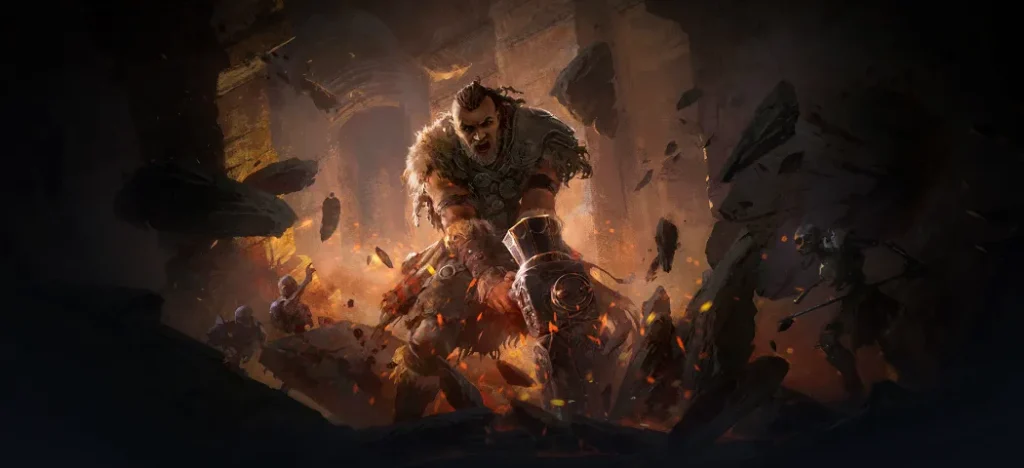
The Warrior is a Strength based class who specializes in crushing foes with oversized melee weapons. His favored weapon is the Mace which includes archetypes like Slams, and Warcries. But if you want to get spicy he can also use a variety of Shield Skills. You're heavily armored to help shrug off enemy blows and can always redirect your strikes mid-attack or dodge roll out if you desperately need to dodge an enemy attack.
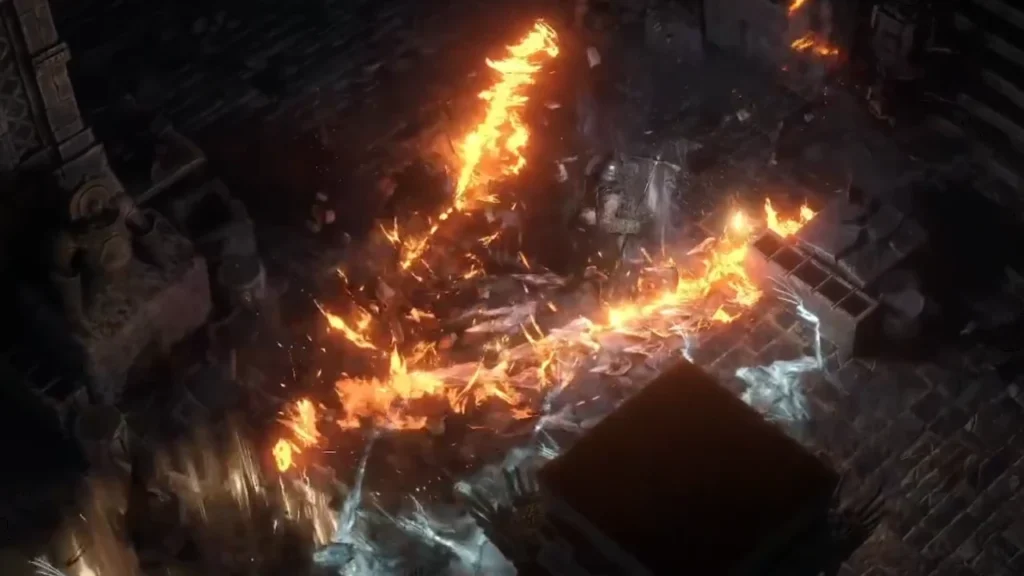
Slams are hard-hitting melee skills that often have an area of effect component. Since they hit hard, you don't get to attack too frequently. But this also means they're the perfect archetype to combine with Warcries. Warcries are a buff that empowers subsequent skills. Want to do big damage? Cast Seismic Cry to double your next slam then use Stampede! There are 20 active skills for Maces that you can experiment with on the Warrior.
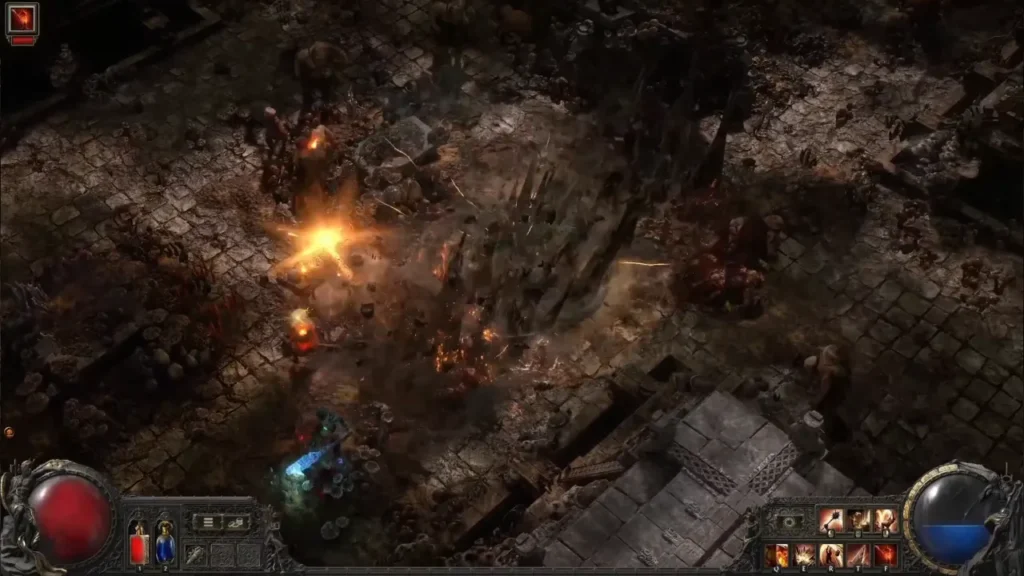
The Warrior also has access to several totems. Some of these, like Shockwave totem directly damage enemies. Others like the Ancestral Warrior meta-Skill, use your Slam Skills. This is great if you want a more relaxed playstyle. But if you want to be even safer, use a Shield Skill. While you have a shield equipped you can actively block to prevent all incoming damage from one direction. You can also use skills like Shield Charge that blocks incoming damage while rushing into enemies dealing damage along the way. Don't hold your block for too long, each hit increases your stagger, and when the bar fills your block breaks. Also watch out for red "unblockable" attacks from certain powerful enemies.
Warrior Ascendancies
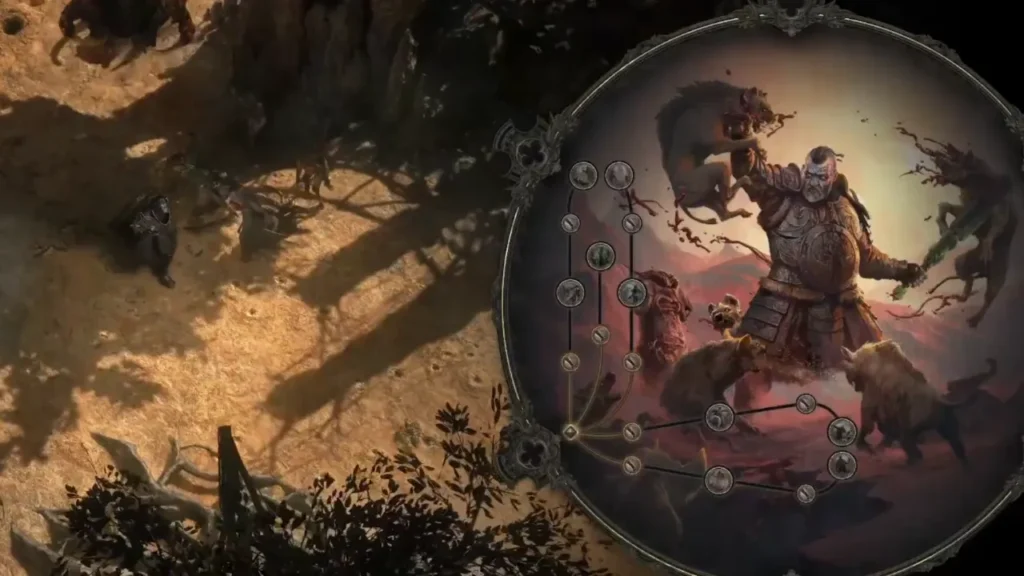
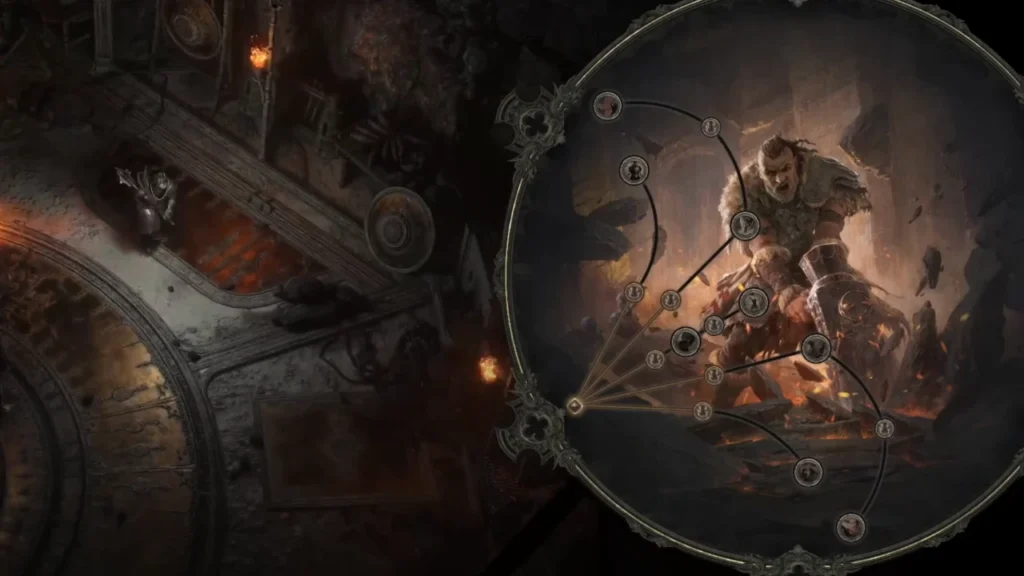
The Warrior has two Ascendancy paths, the Warbringer and Titan. A Warbringer can transform totems into spirits giving them more freedom to attack your enemies. When threatened, he can encase himself in jade preventing damage while the shield lasts. Finally, the Warbringer is able to use Warcries more frequently than other classes, or exlode the corpses of his enemies get ready to shout your enemies to death! On the other hand, the Titan is all about Slams and really leans into the 2-handed weapon fantasy. His slams generate powerful aftershocks dealing additional damage to enemies in a wide area. With Crushing Impact a Titan is able to stun foes more easily, and he can take advantage of this with his massive damage bonus against enemies under the effect of heavy stuns. Just remember, you need Golem's Blood if you want to dual-wield 2-handed weapons or use one with a shield!
Sorceress
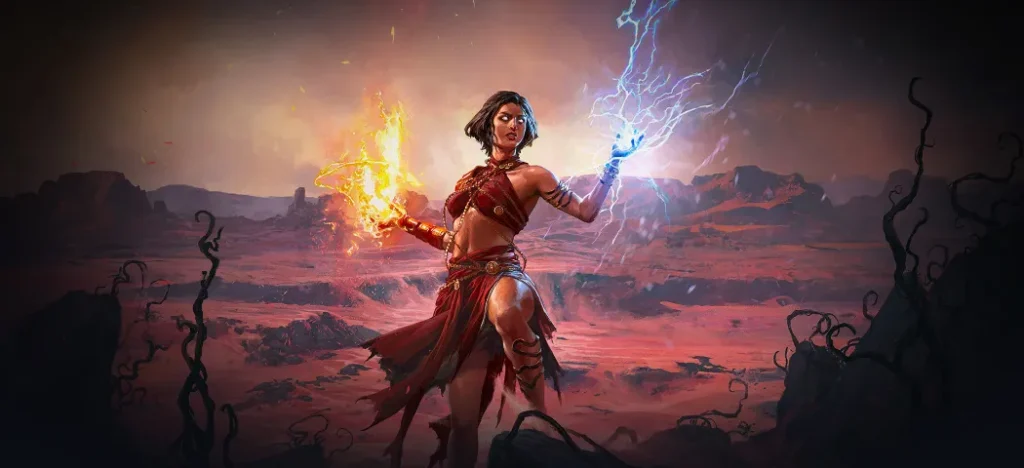
The Sorceress is an Intelligence class who harnesses the 3 elements and bends them to her will. Wield powerful fire skills that Ignite enemies, or use Wall of Fire or Fireballs to set your own projectiles ablaze, adding additional damage. Drop a Comet on your foes, and use other cold skills to Freeze them in place. Or fill the screen with Sparks, Shocking foes making them easier to defeat. The Elemental Skills are made to combo with other spells of different elements.
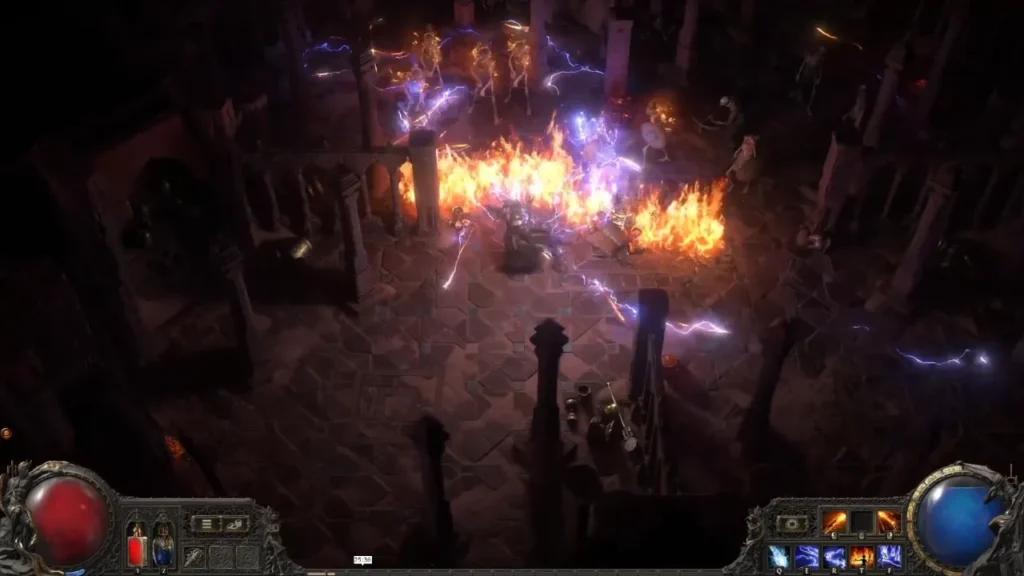
Use Path of Exile 2's dual specialization system to combine multiple elements. You can wield a Fire staff in your main hand, to drop a flame wall then swap to a Lightning Staff to fire all your sparks through. Or use a Fire Skill with the "Cast on Ignite" trigger gem to unleash a devastating Firestorm! Blend 25 elemental skills to unleash peerless devastation.
Sorceress Ascendancies
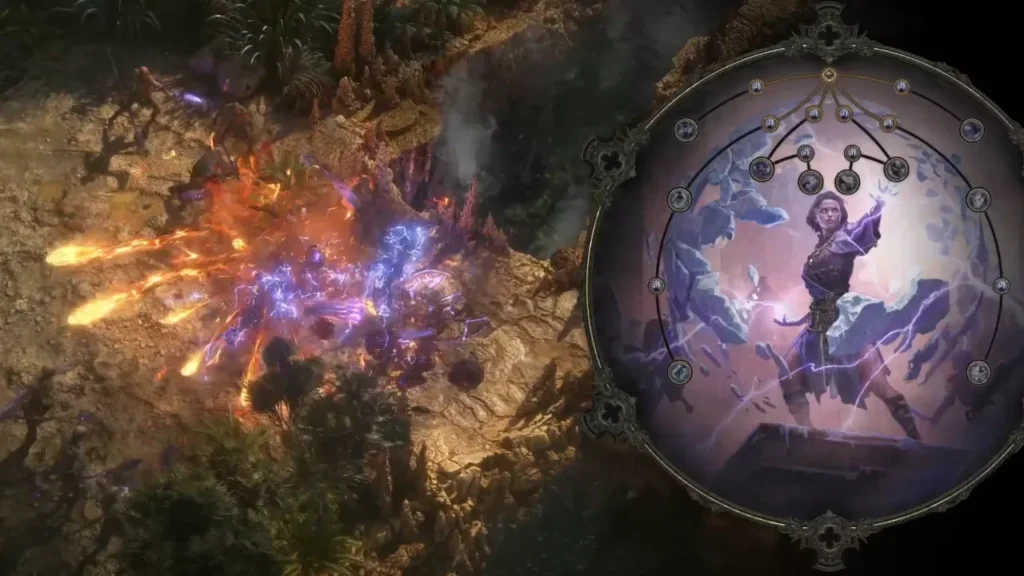
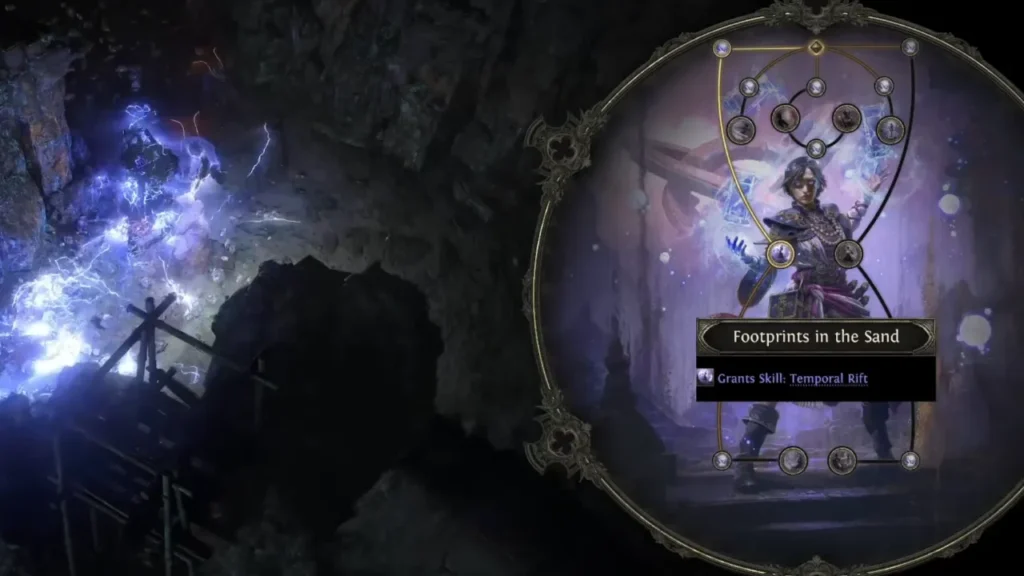
As a Sorceress you can Ascend to become either a Stormweaver or a Chronomancer. The Stormweaver harnesses all things lightning. Deal critical damage to your foes and unleash a devastating lightning storm, or stack 2 Shocks on an enemy for even more damage amplification. If you like shocking Foes, continue investing into the Stormweaver to allow all of your damage to Shock.
On the other hand, Sorceresses who follow the path of the Chronomancer prefer to exert their mastery over time itself. Use Time Freeze to temporarily stop time, preventing foes from acting for a duration. In addition, you can use Temporal Rift to reverse time, sending you back to a prior location and returning your life and mana to what they were at that time. Lastly, if you're tired of cooldowns, use Time Snap to reset them allowing you to use some of the most powerful skills in Path of Exile 2 without any delay. While difficult to master, the Chronomancer offers you a plethora of opportunities to outplay dangerous boss mechanics.
Mercenary
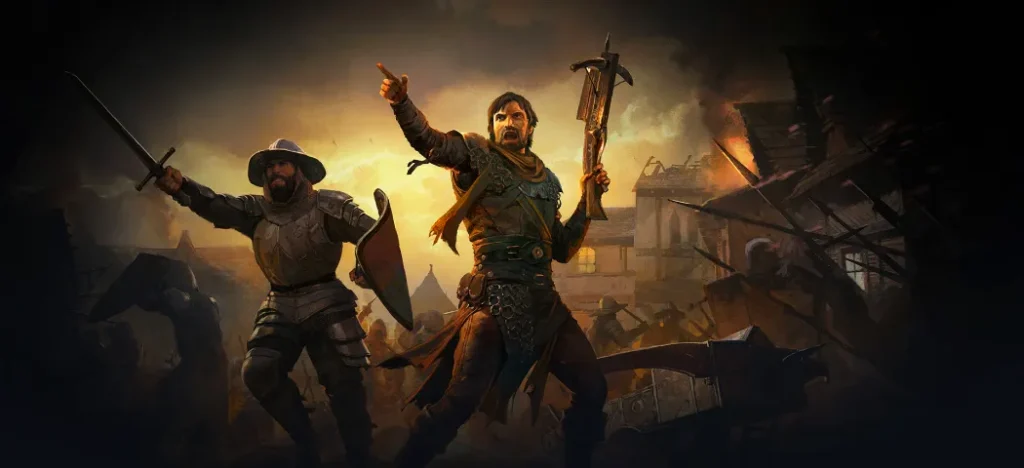
Path of Exile 2's Strength and Dexterity class, the Mercenary draws heavy inspiration from First Person Shooters. This led to a fundamental redesign of how movement is handled in PoE 2 and the addition of WASD controls. The Mercenary reveal focused heavily on the mechanics of Crossbows in PoE 2. You're able to use a Burst Shot (Shotgun), Rapid Shot (Assault Rifle), or Power Shot (Sniper Rifle) Crossbow with a variety of special ammunition. Armor Piercing Ammo inflicts Armor Break, Incendiary Ammo sets enemies on fire and Permafrost Ammo freezes foes in place or creates walls of ice while you lay down suppressing fire.
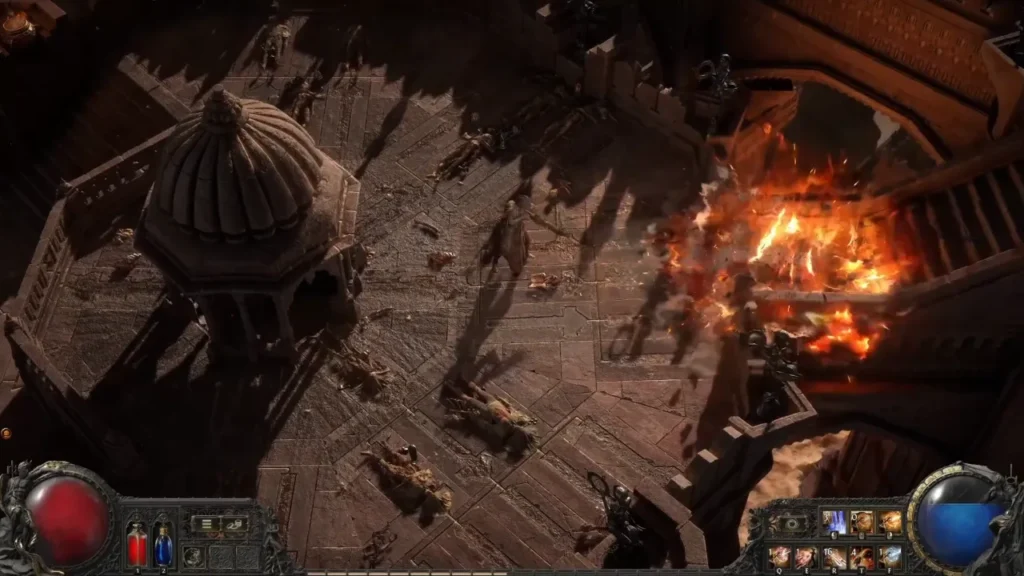
In addition to his Crossbow, the Mercenary comes armed to the teeth with a variety of Grenades. They work exactly as you'd expect and detonate after a short delay. Some Grenades apply crowd control effects slowing enemies, others choke foes with noxious fumes, but most are just there to cause a big explosion.
All of this combines to give you a wealth of options, drop a Glacial bolt to slow your foes before firing a powerful Piercing Shot through their midst. Break their Armor before unloading with High Velocity rounds for maximum damage, or drop a Gas Grenade then detonate the clouds with an Explosive Shot. You can also use Artillery Ballistae for supporting fire if you need some help on single target. the reveal confirmed that Path of Exile 2 has 22 crossbow skills for you to experiment with.
Mercenary Ascendancies
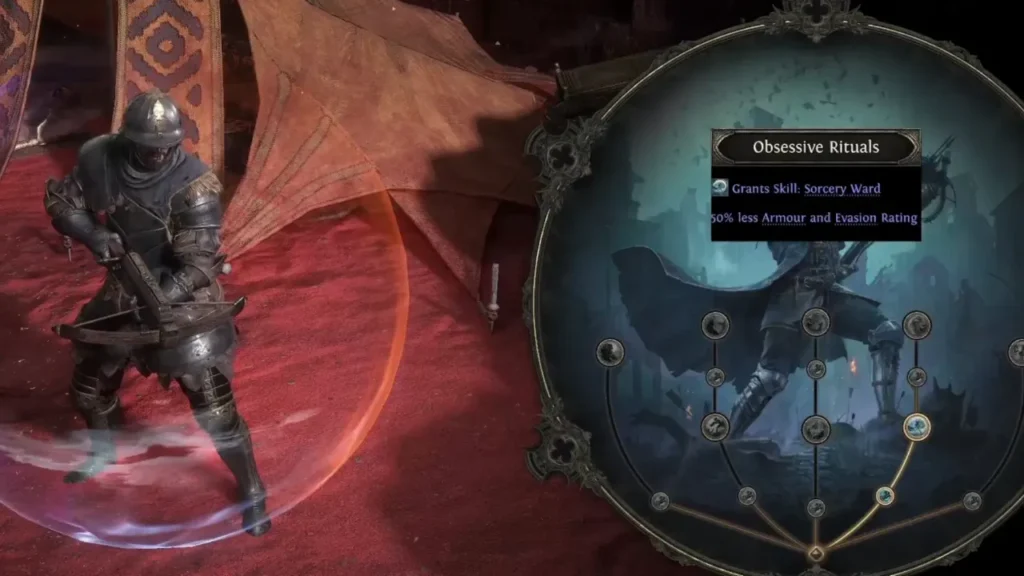
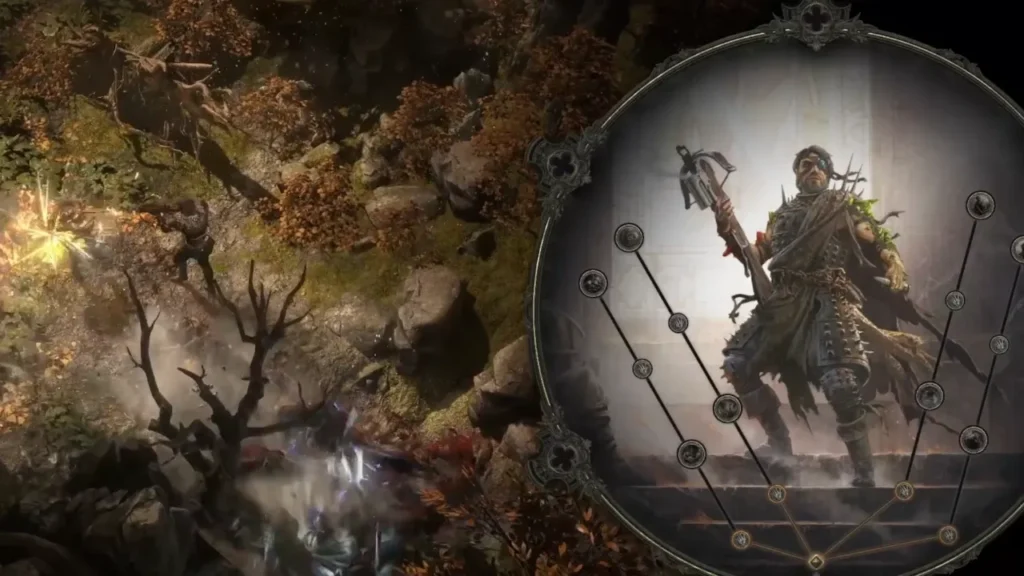
As a Mercenary, you're always up for work, but you need to choose your profession. Some Mercenaries become Witchhunters and specialize in killing thaumaturgists. As a Witchunter you tap into the Arcane Arts gaining the ability to generate a Sorcery Ward. This shields you from elemental damage at the cost of your physical defenses. You also gain the ability to interrupt enemy spells by dealing damage, slowing the rate at which dangerous foes use their skills. Lastly, some Witchhunters learn Decimating Strikes, removing up to 30% of an enemy's health with their first hit.
Your other option is the Gemling Legionaire, an Ascendancy that focuses on skill gems. If you want to use additional skills, this is the Ascendancy for you! Unleash the true potential of your skills, increasing your Maximum Resistances based on the number of supports you have equipped. Then, make all of your skills better by increasing their quality. As a Gemling Legionaire, you can use your highest attribute to satisfy requirements for other skills.
Monk
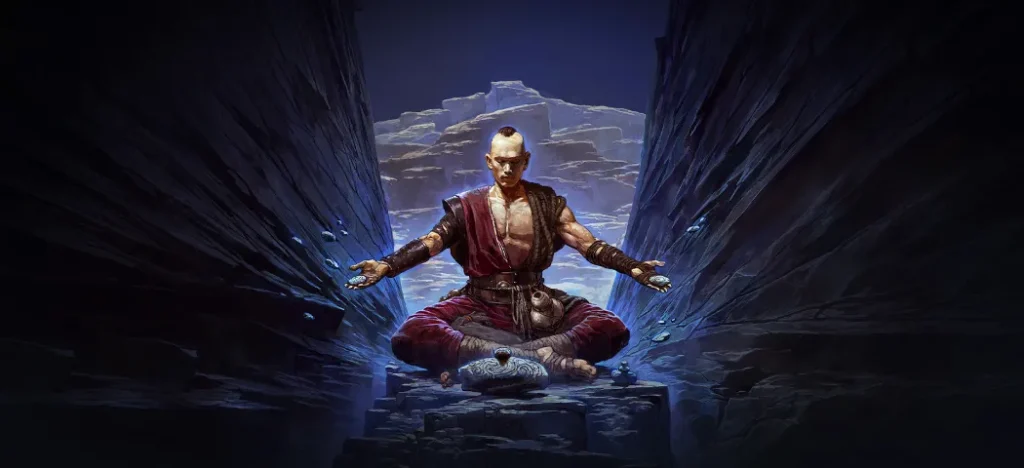
The Monk is a highly mobile Intelligence and Dexterity Class. He dashes into combat to strike at foes with his Quarterstaff before executing a quick retreat before enemies can retaliate.
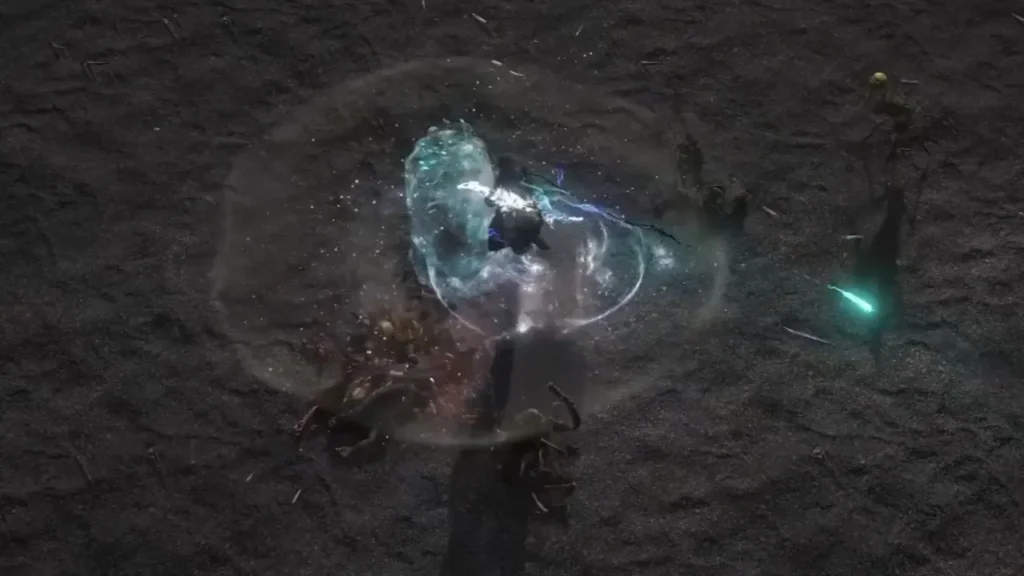
Quarterstaff Skills cover the elements of Lightning, Ice, and Wind. Killing Palm dashes to enemies killing them when they're on low life to grant you a Power Charge. Or drop a Tempest Bell that resonates when struck. Then hit it with elemental damage to empower all your subsequent strikes. Use Staggering Palm when enemies are close to being stunned to unleash a barrage of wind projectiles. There are 21 active skills for quarterstaves, providing you with a wealth of martial arts options.
Monk Ascendancies
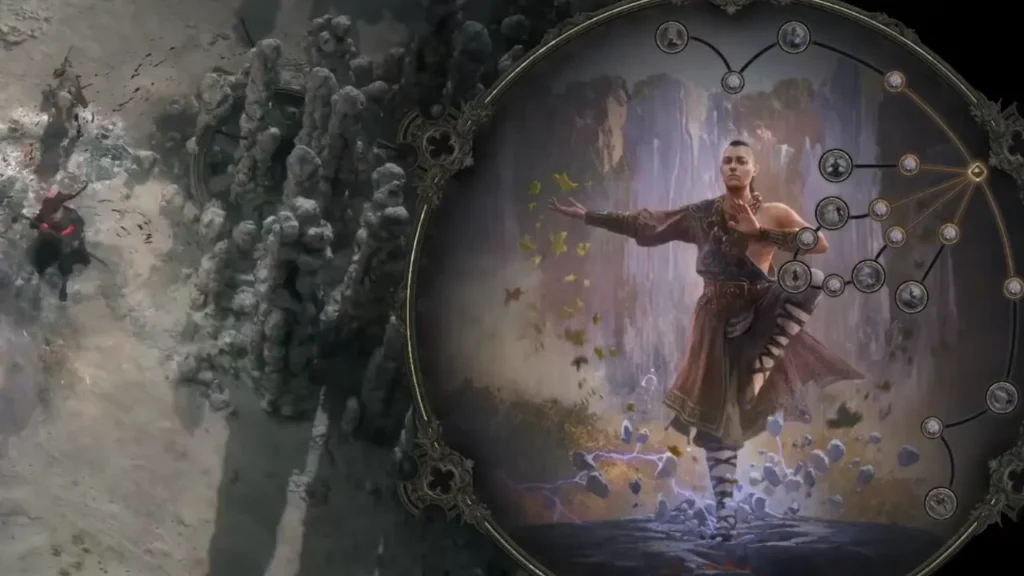
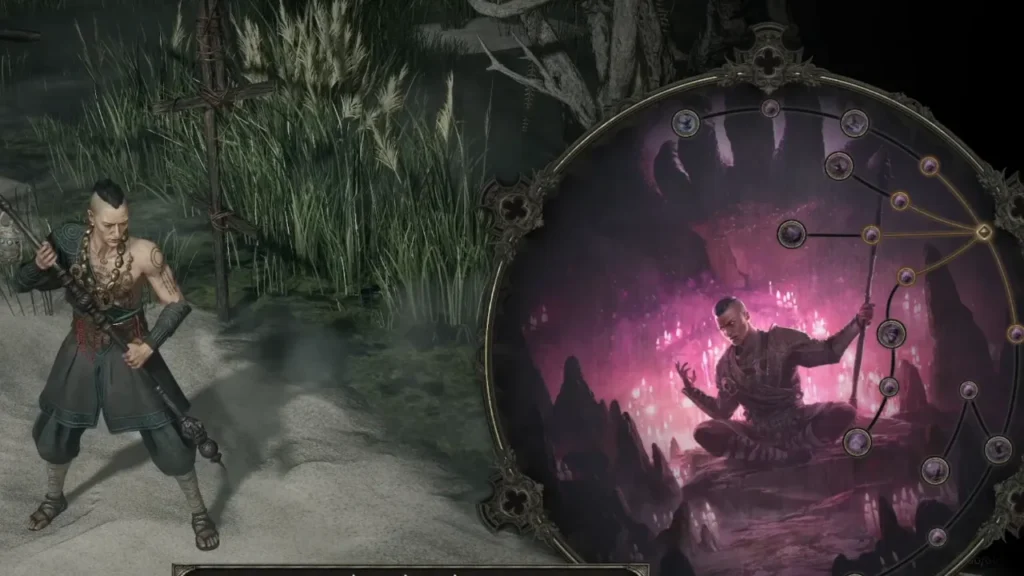
As a Monk you have two Ascendancy Paths. First, you can become an Invoker to harness your inner strength creating waves of raw elemental force. Invokers can meditate to double their energy shield, providing additional defenses. You can further specialize in either cold or lightning and unlock more bonuses for that element. Later on you can take the form of a powerful Unbound Avatar by applying status effects to build up unbound fury then unleash this for even more damage and elemental bonuses.
On the other hand, some Monks turn to darkness, becoming an Acolyte of Chayula. This transforms your Spirit into Darkness. You can use Shroud of Darkness to protect yourself from attack based on your Darkness. Or alternatively, stack more of it for potent chaos damage bonuses. This isn't where the defenses end, you also gain additional defenses against Chaos damage. You also get instant mana leech and the ability to apply it to your Energy Shield providing a potent layer of recovery. A few brave Acolytes of Chayula choose to peer into the Breach to gain the Flames of Chayula but remember, the Breach always stares back.
Ranger
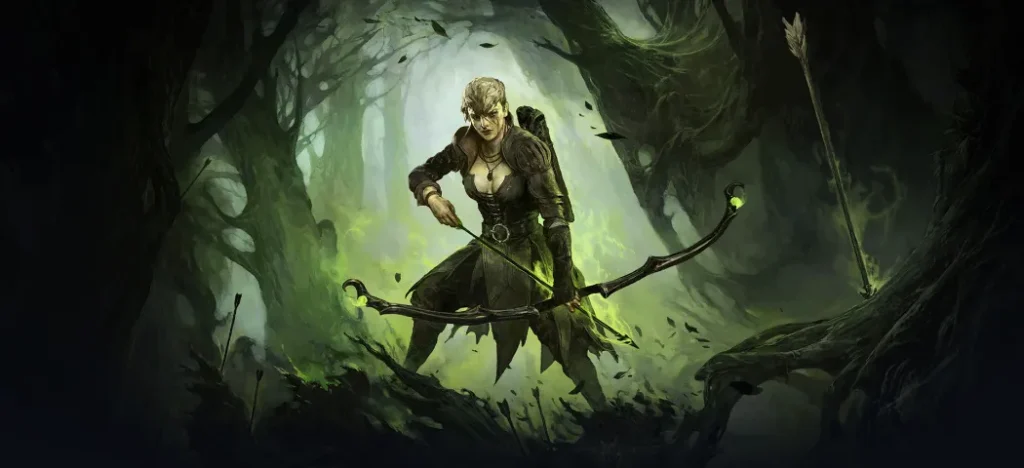
After years away the Ranger explores her old hunting grounds. These once familiar forests have grown dark and now teem with sinister enemies. Wraeclast's master survivalist returns in search of new prey. All it takes is a determined woman and her bow to change the world. Because she can shoot while moving, and a lot of bow skills have built-in jumps you're going to be able to easily outmaneuver enemies. The Ranger uses a variety of bow skills focused around lightning, poison, ice, and physical.
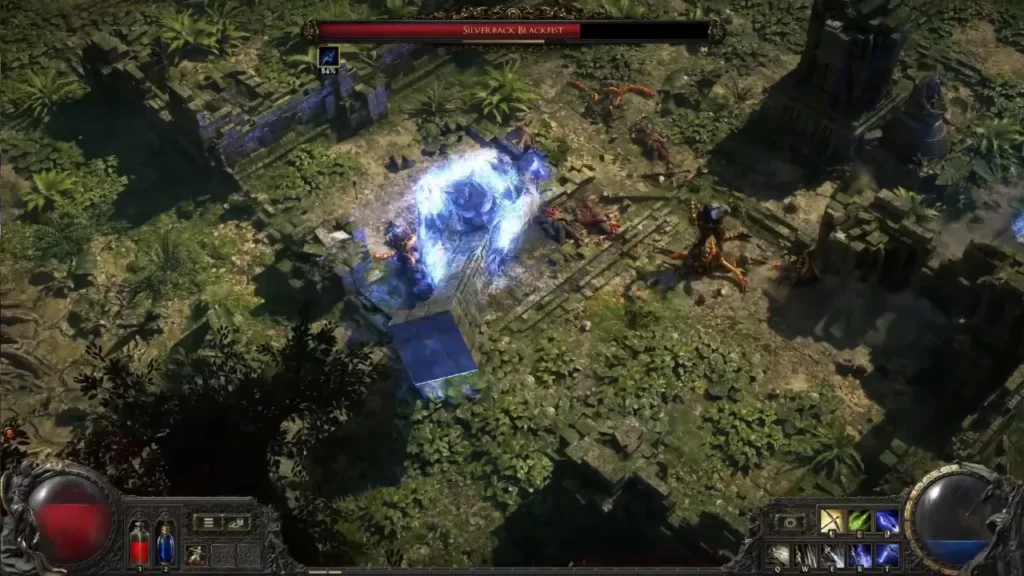
Her Lightning attacks bounce between foes, electrocute them inflicting a stunning effect, and plant arrows in the ground to deal more damage. Cold skills slow and freeze foes, making it easy to escape their attacks. Poison skills generate highly flammable clouds of gas, deal damage over time, and create toxic plants to harry your foes.
Ranger Ascendancies
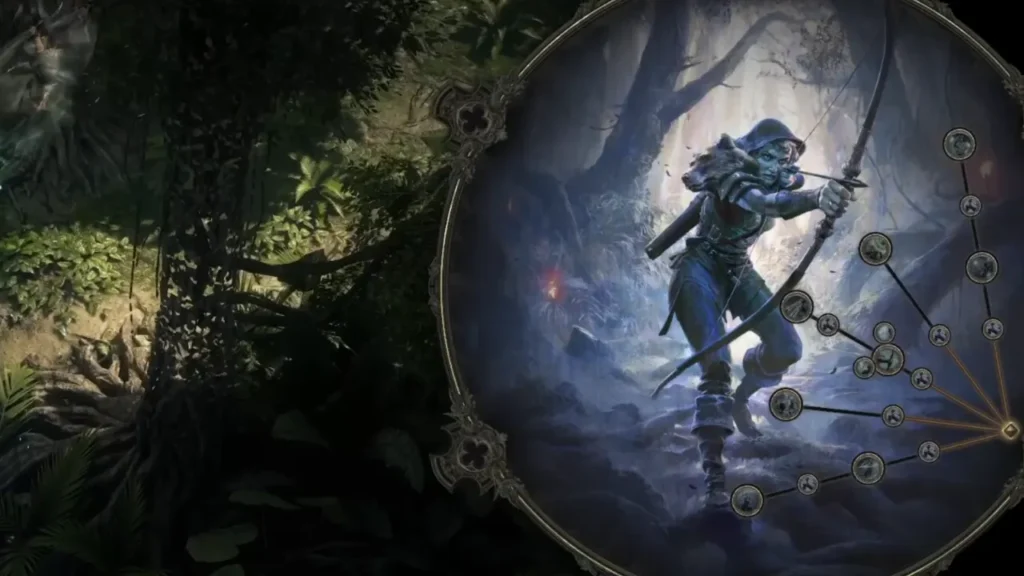
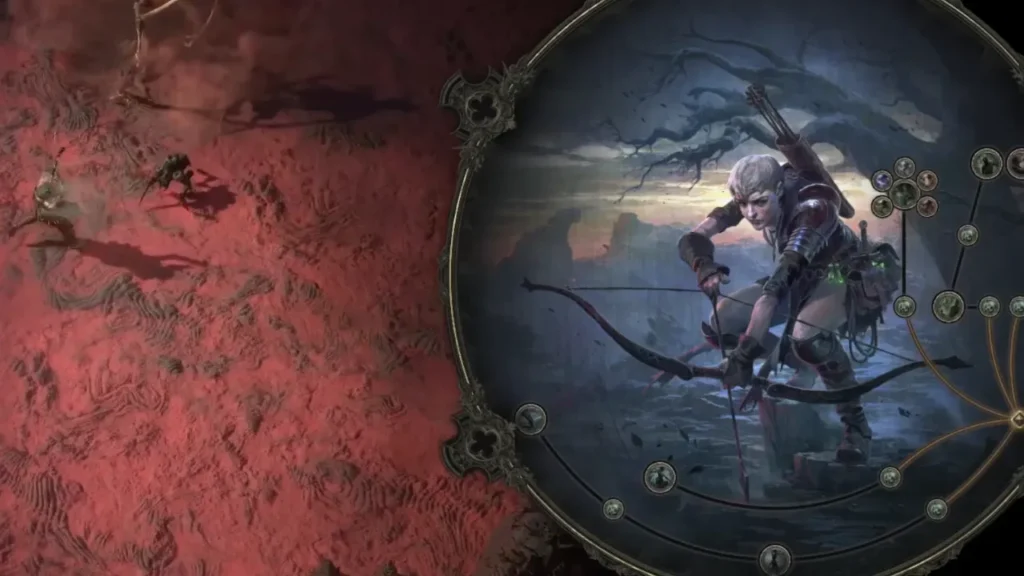
As a Ranger you can become either a Deadeye or a Pathfinder. The Deadeye fires additional projectiles, making it easy to bury foes under a withering barrage. Alternatively, stack tailwind up to increase your speed, just be careful you lose the speed after taking damage. With Eagle Eyes, you never miss, taking down foe after foe with ease and grace.
Pathfinders focus on Flasks and Poison. You can choose between 5 throwable concoctions that are fueled by your Flask charges. Each concoction deals some damage and inflicts a crippling ailment on any enemies caught in the splash zone. You can also cause your poisons to spread between different foes while making them twice as potent. Last up Pathfinders can move more quickly while firing and become immune to slow effects making this a great choice for anyone who wants to go fast while still dealing damage.
Witch
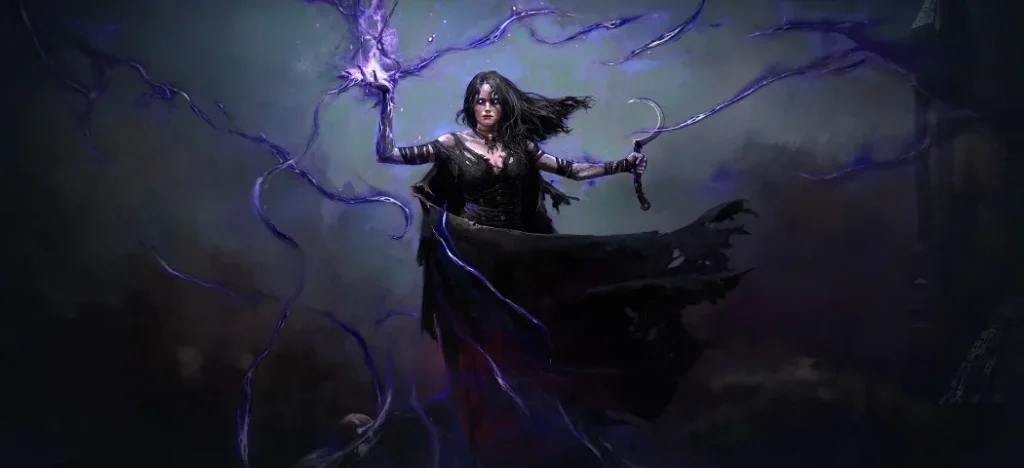
Surrounded by her loyal Minions the Witch makes a triumphant return to the land she previously bent to her will. Now armed with occult incantations and an army of minions she is here to tear through everything in her path. Use your Spirit to build a minion army, or attack foes directly through Chaos and Bone Skills. Then curse enemies to weaken them and make it easier to take out dangerous bosses.
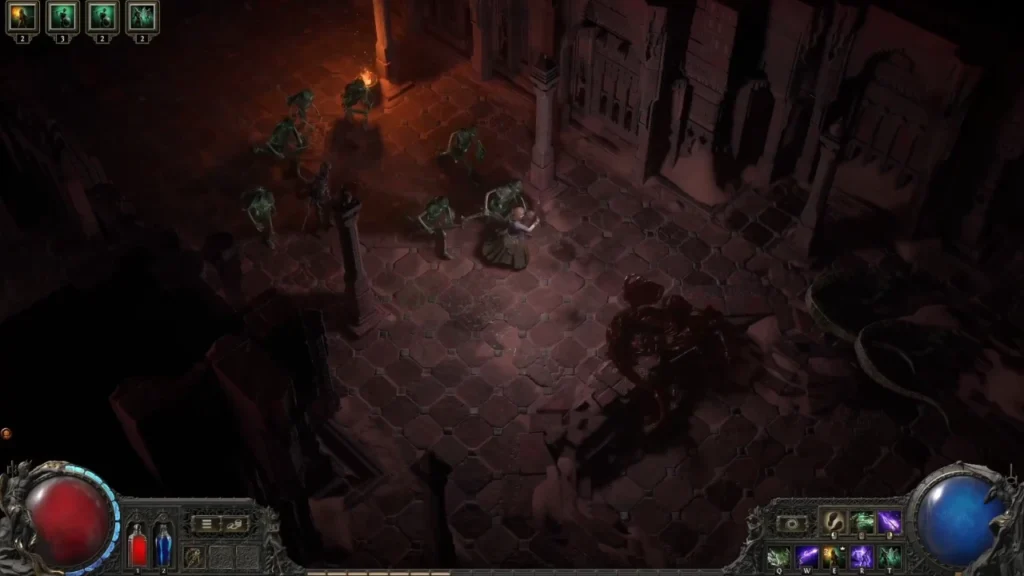
Minions resummon when they die. You can use weaker Skeletal Warriors, or powerful skeletal arsonists. Each minion has a special active ability these are called "Command Skills" for example the Skeletal Arsonists can detonate your other minions. Use corpses for temp minions to grow the ranks of your minion army.
Witch Ascendancies
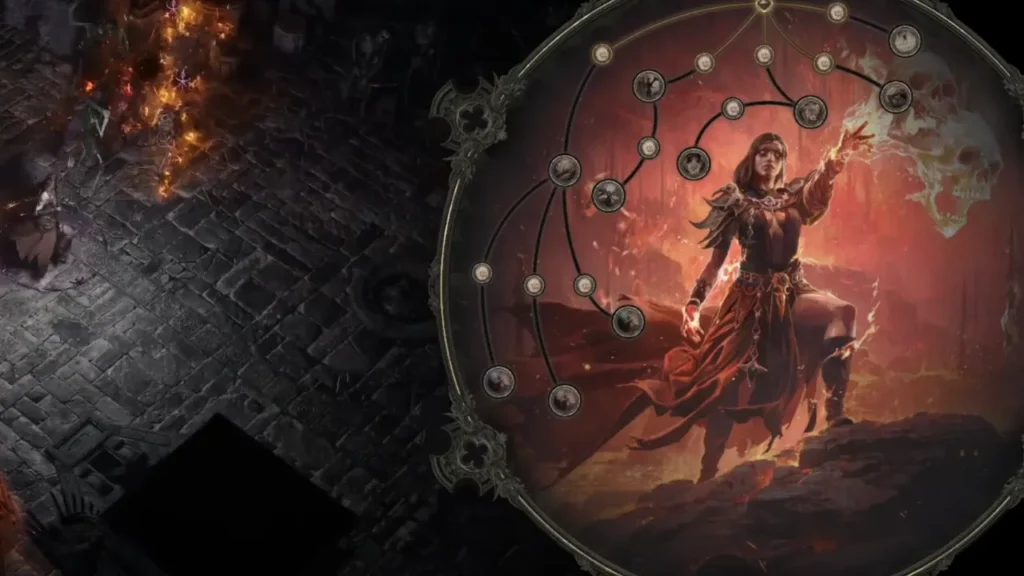
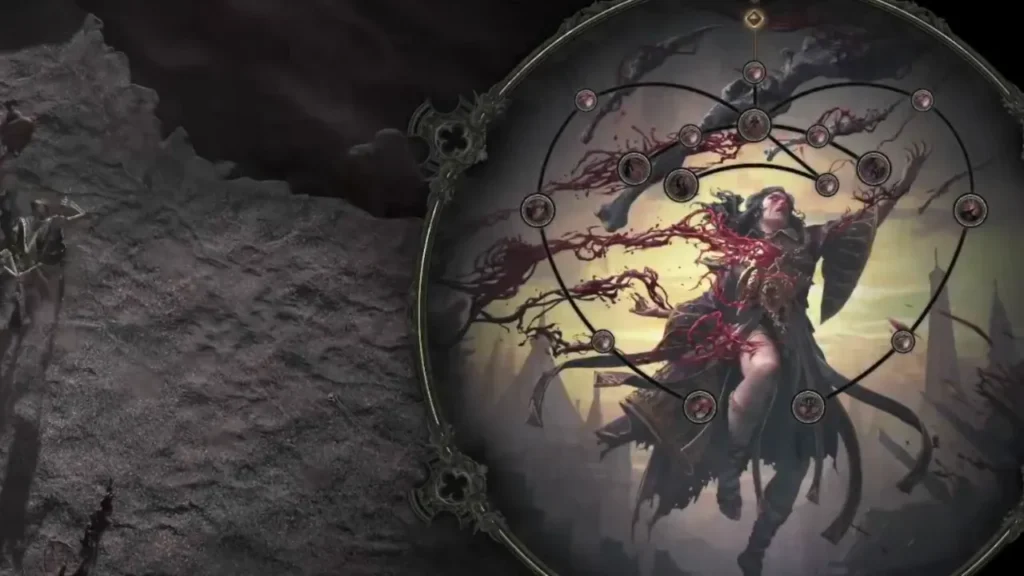
Draw upon infernal powers to become an Infernalist. You get a loyal Hellhound who attacks your enemies and protect you by taking a portion of your damage for you. He's also the best boy who is able to set foes on fire. You can also infuse your mana with hellfire, entering Mana Overload and triggering fiery explosions. Or go all in and enter Demon Form. In Demon Form you take damage that ramps up over time in exchange for ever-increasing cast speed and damage bonuses, how long will you survive?
The Witch's other ascendancy option is to become a Bloodmage. This comes at a steep price, paying a life cost in addition to the regular mana cost for all your skills. But in exchange you get extra life based on some of your Energy Shield gear, the ability to leech damage from your spells, and a new form of healing via Life Remnants, which you gain by killing enemies. Bloodmages can also invest into life for damage, with a critical strike bonus of 1% per 20 maximum life.
Skills in Path of Exile 2
In Path of Exile 2, skills come from powerful gems. These are divided into 3 categories, first up, active skills which you use to damage your enemies. Then you have Support Skills, these gems are socketed into active skills to enhance their effects. Finally, you have Spirit Skills, these are special auras, buffs, and trigger effects which you activate by reserving some of your Spirit. They make your character stronger or interact with other skills you have equipped.
Active Skills
You use a variety of active skills to unleash devastation on your enemies. Some of these come from your weapon's implicit properties. Others you find on your journey in the form of Uncut Skill Gems. After finding an Uncut Skill Gem use the Engraving menu to craft it into a new active skill, or raise the level of one of your existing skills. Each Active Skill has an attribute requirement that you must meet to wield it.
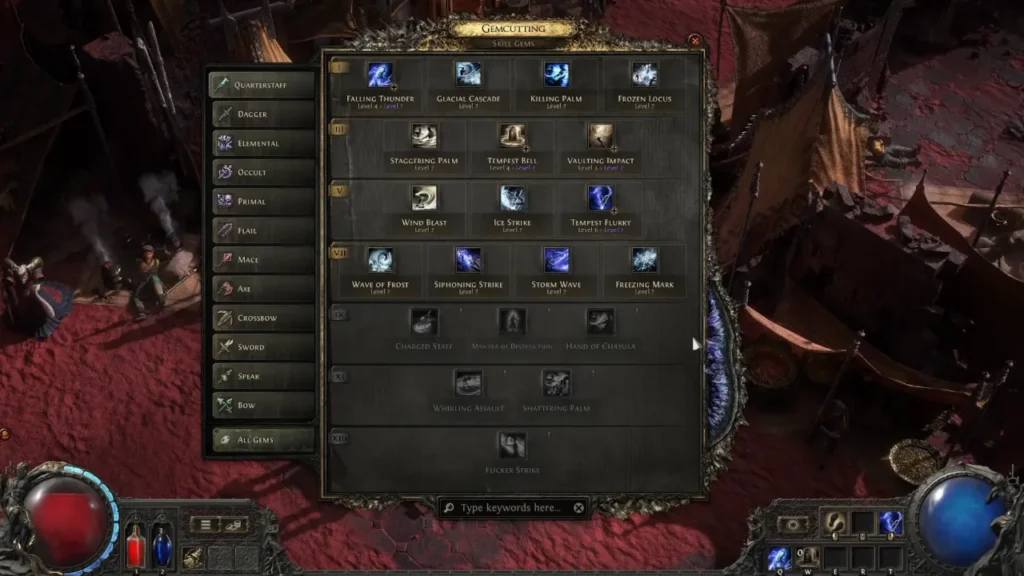
Active Skills are divided by weapon subtype. For example, many Slam skills require you to wield a mace. On the other hand, some skills, like many elemental Spells don't require a specific weapon and are instead powered by your own inherent magic. When you start the game, we suggest you stick to the recommended skills for your class. But after you play for a bit, you should start experimenting with skills from other classes to find powerful synergies.
Support Skills
Active Skills form the backbone of your build, but you need to use Support Gems to unlock their full potential! These Supports also have attribute requirements, you must increase your Strength, Dexterity, or Intelligence to equip more supports of that type. When supporting your skills, you need to choose carefully because you can only use 1 copy of each support on your character.
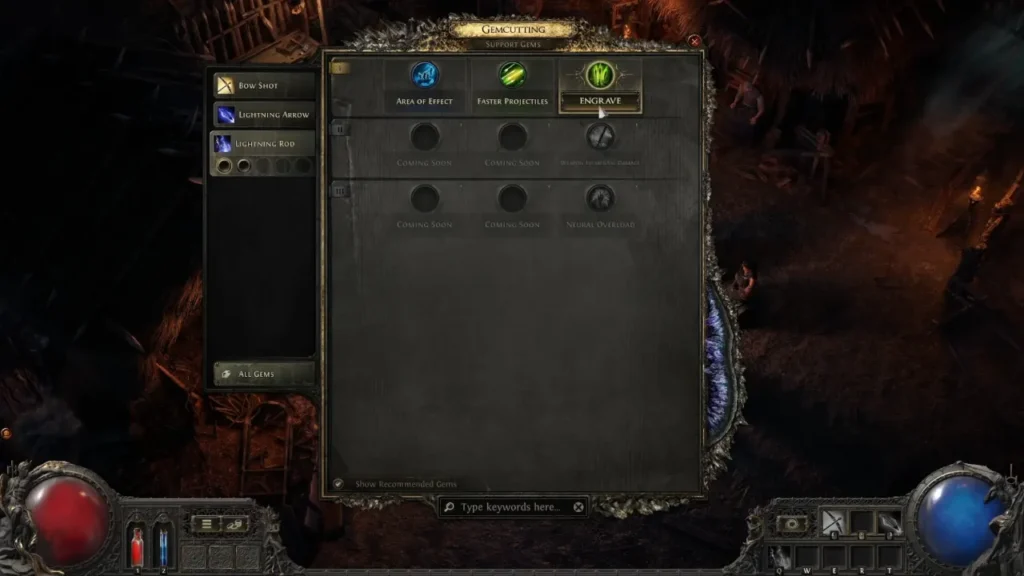
Most support gems change the mechanics of a skill. For example, using multiple projectile support to increase the number of projectiles generated by everything from elemental spells like sparks to the mercenary's grenades. These projectiles can be used to cover a wider area on the screen or cause explosive effects to overlap for massive single target damage.
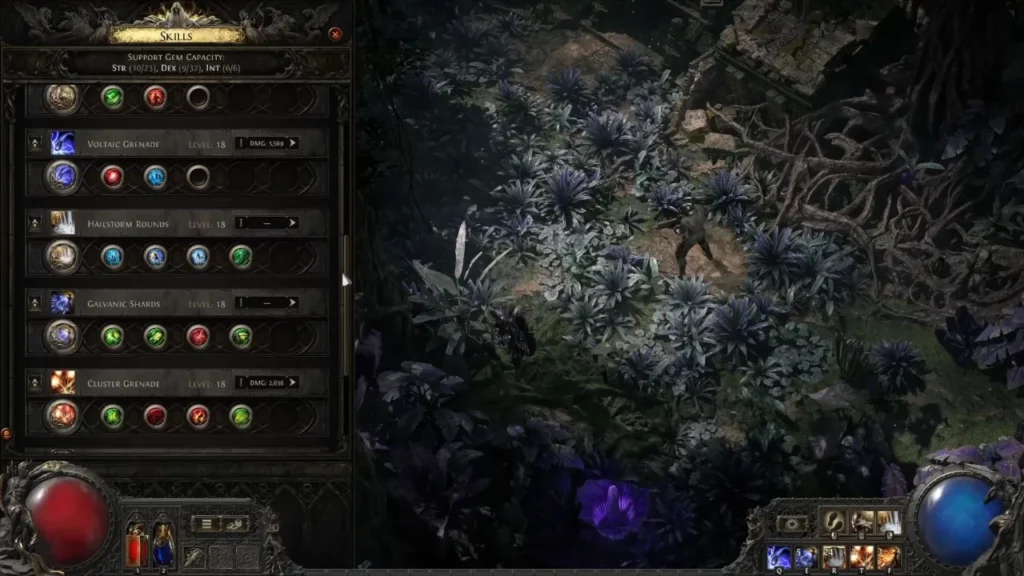
Each skill can have up to 5 supports allowing you a huge variety of skill customization that completely transforms the way you play.
Spirit Skills
Lastly you have Spirit Gems. These are special skills that reserve Spirit to provide powerful persistent effects. Buffs provide offensive or defensive bonuses to your character, summon Minions to attack your foes, or use Meta Gems to automatically trigger other skills when the right conditions are met.
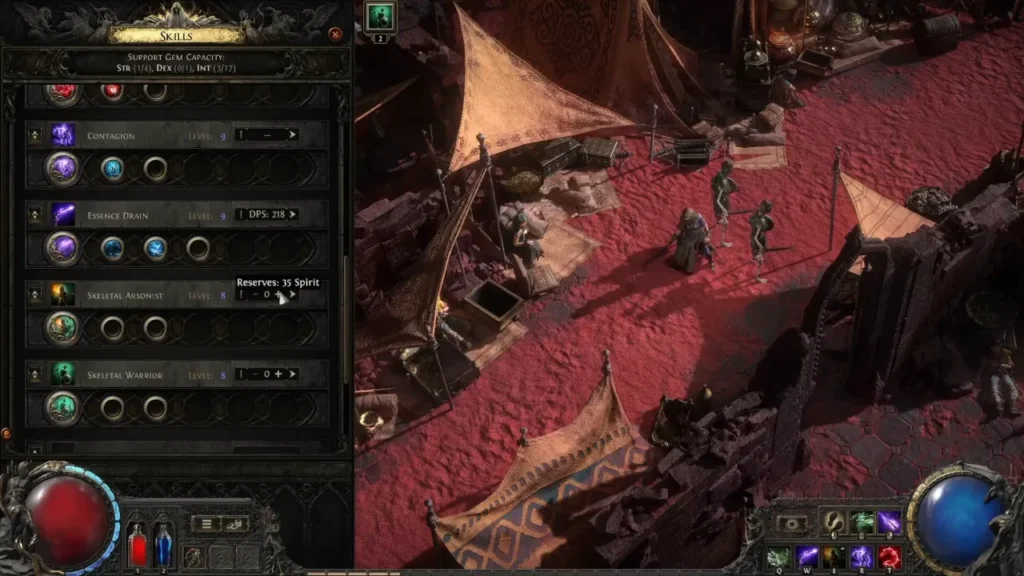
If you need more Spirit, you have a couple of options. First up, equip a Sceptre, this is a special weapon class that gives spirit bonuses and has unique affixes that make the buffs from Spirit Skills more potent. Also, keep an eye out for optional bosses who give Spirit. The first one you encounter is the King in the Mists who gives +30 Spirit, but there are several others throughout the campaign.
Flasks and Charms
In Path of Exile 2 you have 1 Life Flask and 1 Mana Flask. This offers you a way to recover your precious resources during combat. To power these flasks, you need to kill monsters. But Flasks aren't the only thing powered by your kills. In addition, Path of Exile 2 is adding a new item type; Charms, we didn't get much info in the reveal but here are some basics.
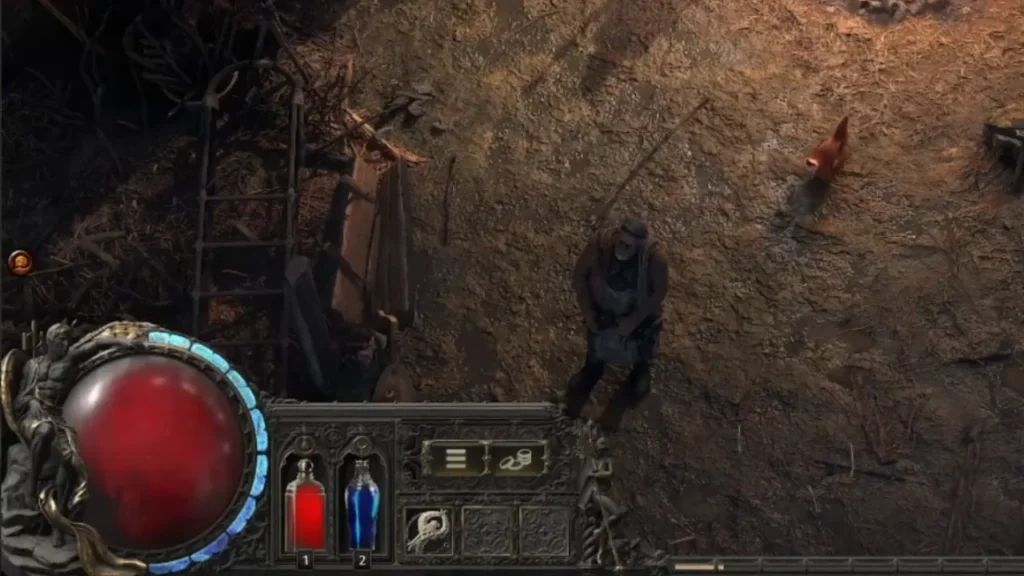
Charms take the place of other flask effects from Path of Exile 1, these build up charges based on your flask charges and trigger when a condition is met. For example, a Sapphire Charm automatically triggers when you take cold damage from a hit.
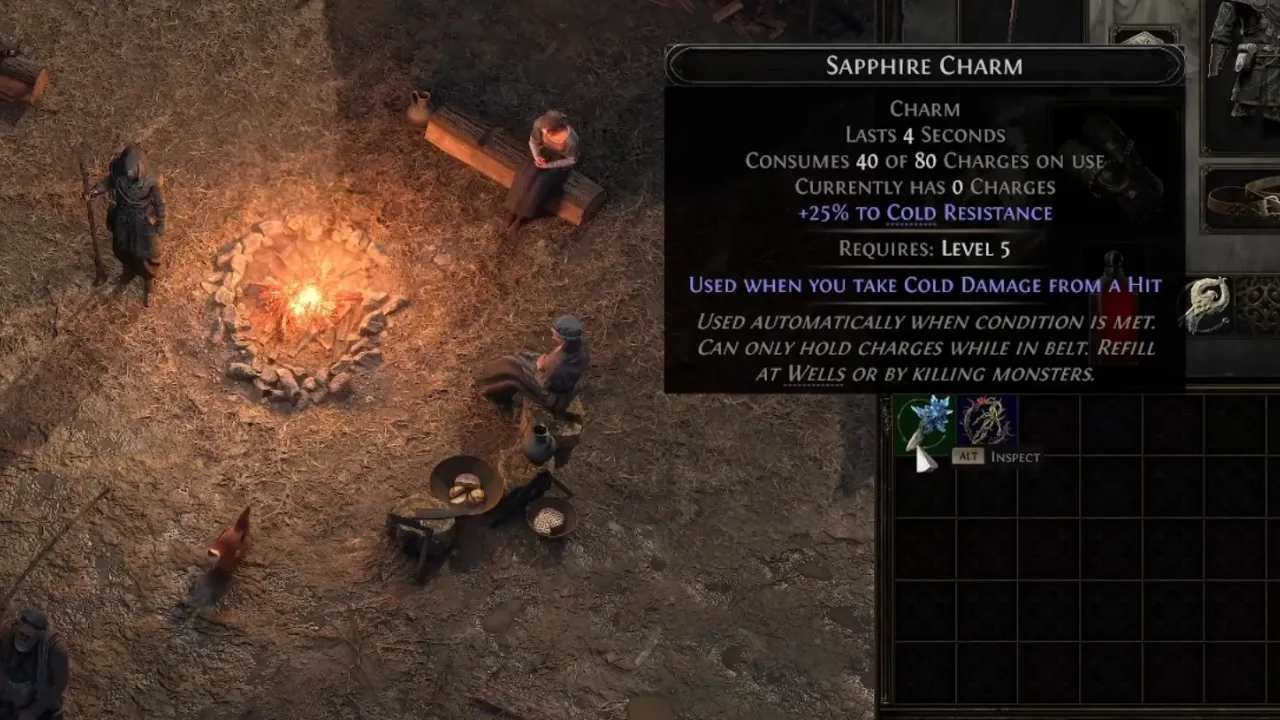
Passive Skill Tree
The Path of Exile 2 passive skill tree is expansive, and a little bit intimidating. There are 1,500 nodes to choose from and each class has a distinct starting location where you find bonuses related to your class. But after that, you're free to travel across the tree. Nodes on the tree are broken into clusters, each specializing in different bonuses. You might find a projectile cluster, fire cluster or mace cluster each of which offers different bonuses.
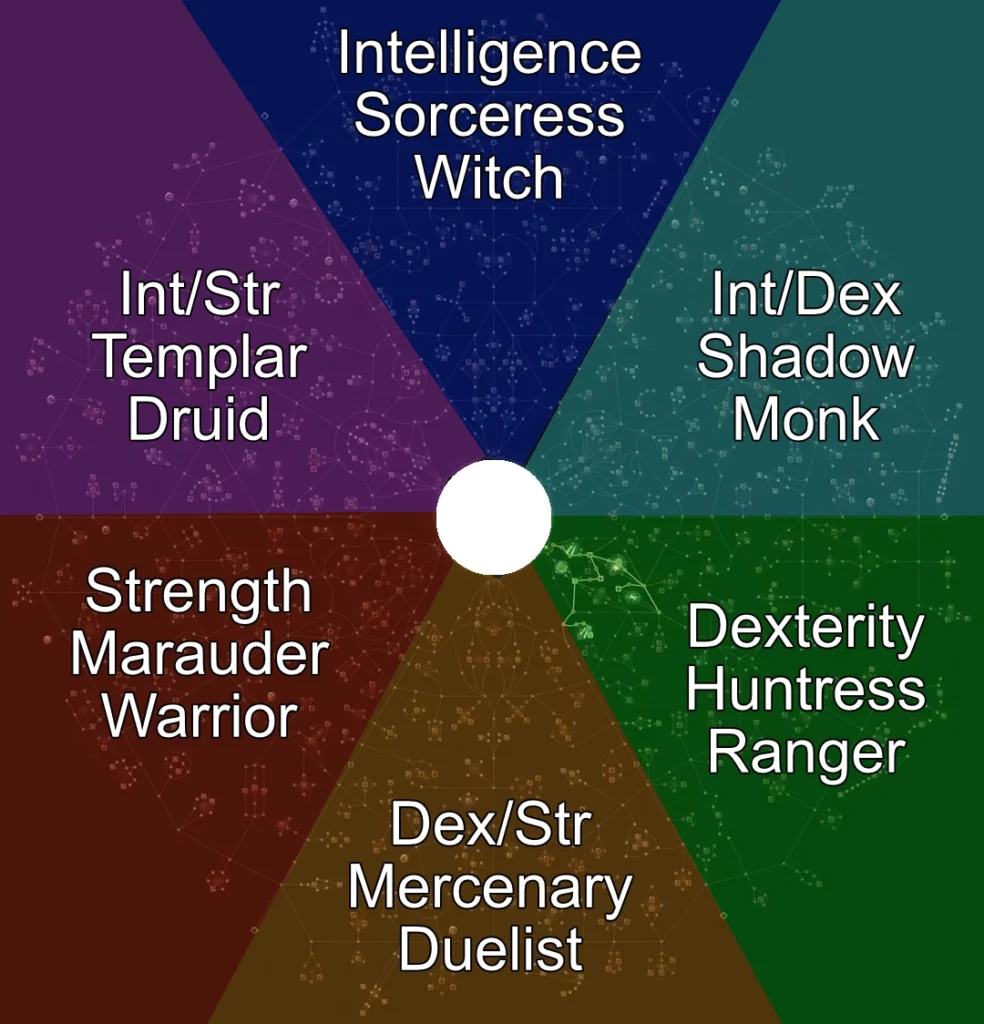
Passive Tree Nodes
First up, you have Travel Nodes, these give +5 Strength, Dexterity or Intelligence. You use travel nodes to meet skill and item attribute requirements. These are fully customizable and can be respecialized by spending gold. Now let's go over a few of the passive types found on the tree.
- Small Passives, these give a simple bonus like a % damage increase related to the cluster.
- Notables are medium sized nodes with more potent bonuses. Here are a few examples of the effects you can access from the Mercenary's area of the skill tree.
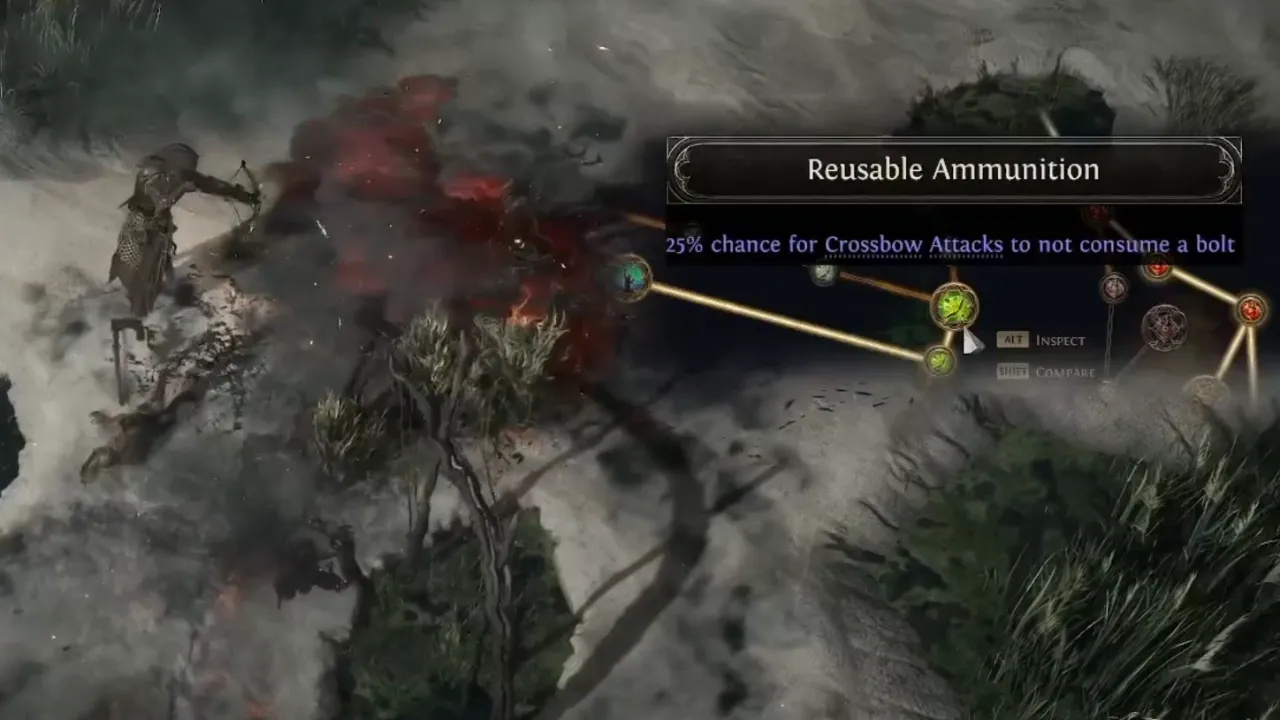
Keystones are the large nodes on the Passive Skill tree, each has a very powerful upside, but they also come paired with a downside. Look for upsides that enhance your build, and downsides you can build to avoid.
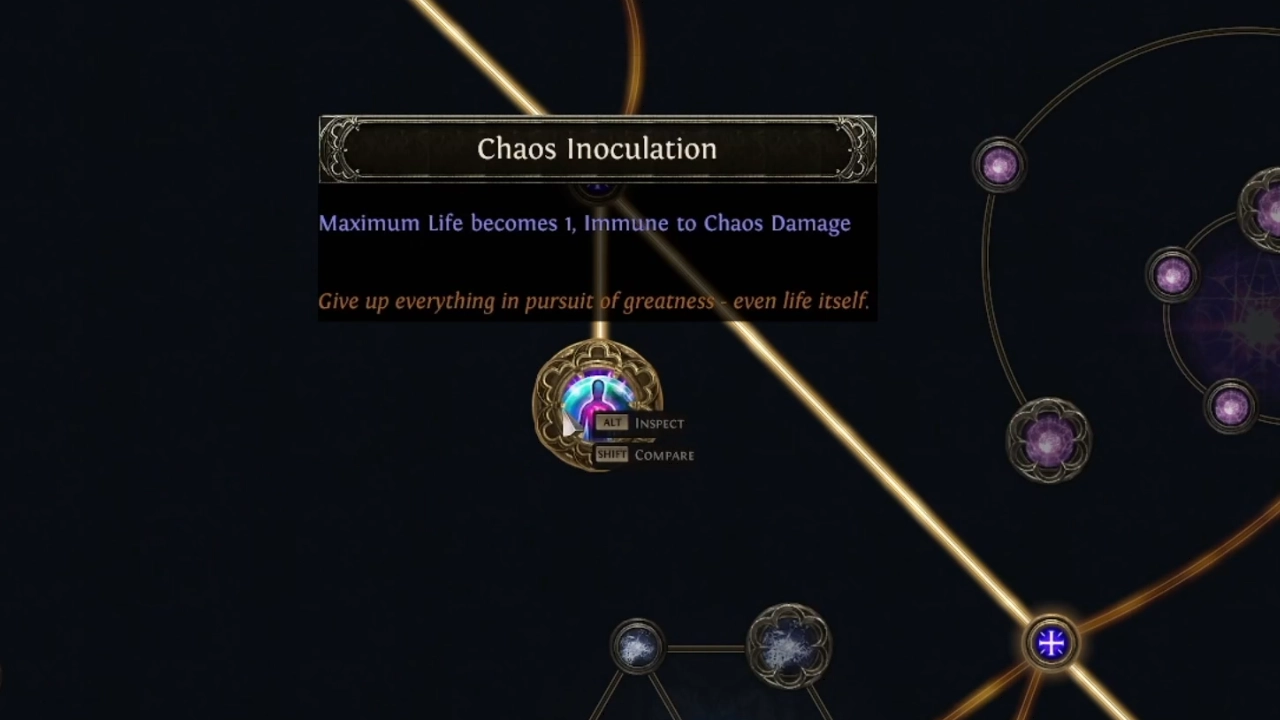
Dual Specialization
In Path of Exile 2 you have 2 weapon sets, and the Dual Specialization system allows you to allocate specific passives on your tree to each. Not only does this give you more options for character customization but it means you can use a synergistic weapon set to cover for weaknesses in your build. Some examples from the reveal include;
- Swapping between 2 elemental damage types like fire and lightning while sticking to generic bonuses on your main tree.
- Using a 1h weapon and a shield for defense then swapping to a 2h weapon for big damage.
- Setting up Curses on your Witch before switching to Chaos skills to melt enemies around you.
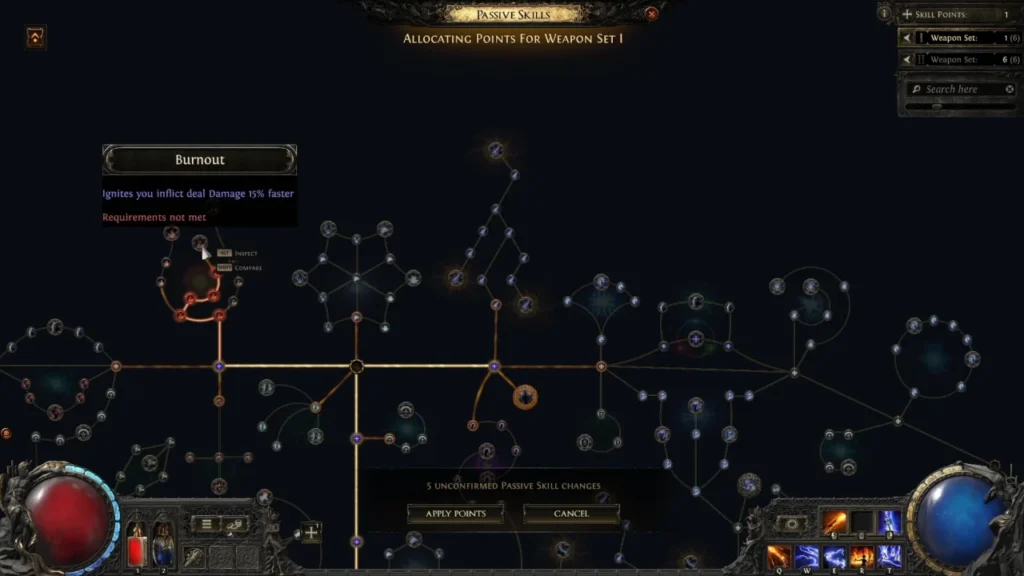
These passive points are obtained by completing quests and defeating optional bosses during the campaign. One of these is the Crowbell, which you can find pretty early.
Items
You find Normal, Magic, Rare and Unique items along your journey. Unique items cannot be crafted but for all other items there are a wide variety of currency items which you can use to modify them.
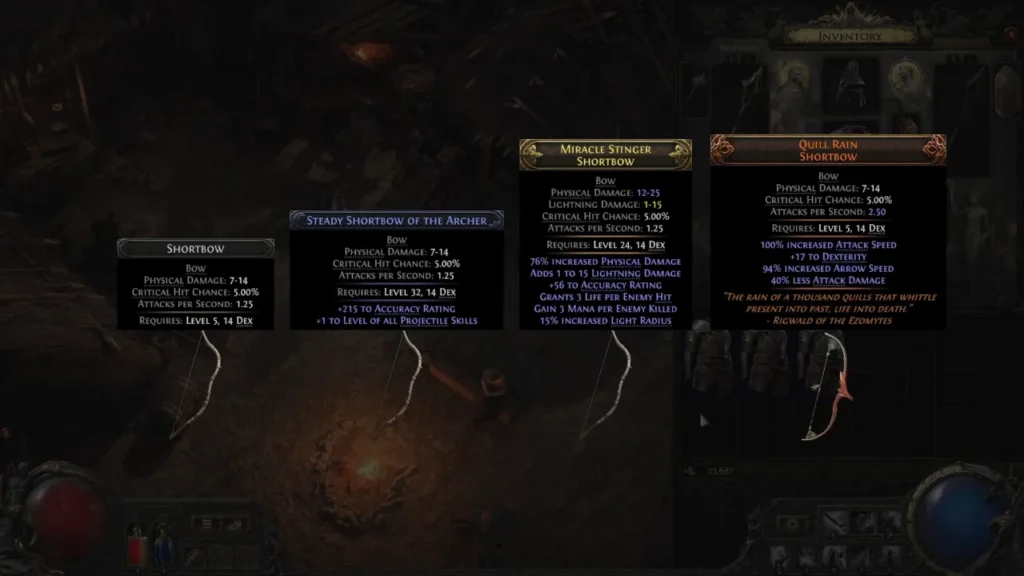
 Transmutation Orb - Transforms a normal item to a Magic item with 1 Affix.
Transmutation Orb - Transforms a normal item to a Magic item with 1 Affix. Augmentation Orb - Adds 1 Affix to a Magic item.
Augmentation Orb - Adds 1 Affix to a Magic item. Alchemy Orb - Transforms a normal item into a Rare item with 4 Affixes.
Alchemy Orb - Transforms a normal item into a Rare item with 4 Affixes. Orb of Chance - Randomly transforms a normal item into a Magic, Rare, or Unique item.
Orb of Chance - Randomly transforms a normal item into a Magic, Rare, or Unique item. Regal Orb - Transforms a Magic item into a Rare item, adding 1 Affix.
Regal Orb - Transforms a Magic item into a Rare item, adding 1 Affix. Exalted Orb - Adds 1 random Affix to a Rare item.
Exalted Orb - Adds 1 random Affix to a Rare item. Orb of Annulment - Removes 1 random modifier from a Magic or Rare item.
Orb of Annulment - Removes 1 random modifier from a Magic or Rare item. Chaos Orb - Removes 1 random modifier and replaces it with another random modifier.
Chaos Orb - Removes 1 random modifier and replaces it with another random modifier. Divine Orb - Randomizes the numerical values of an item.
Divine Orb - Randomizes the numerical values of an item. Vaal Orb - Unpredictably changes the item and prevents the item from being crafted further.
Vaal Orb - Unpredictably changes the item and prevents the item from being crafted further.
On the other hand, if you have unwanted items you can disenchant them for currency shards or sell then to a vendor for more gold. GGG has improved vendor items for Path of Exile 2 to ensure you get more relevant options.
Sockets
Now in Path of Exile 1, your sockets hold Skill Gems and Supports. In Path of Exile 2 you can socket Ezomyte Runes into your items. Chestpieces and 2-handed weapons can have 2 sockets, all other items can have 1. Later on in the endgame you can use Vaal Orbs to add more sockets, or add powerful Soul Cores for better bonuses.
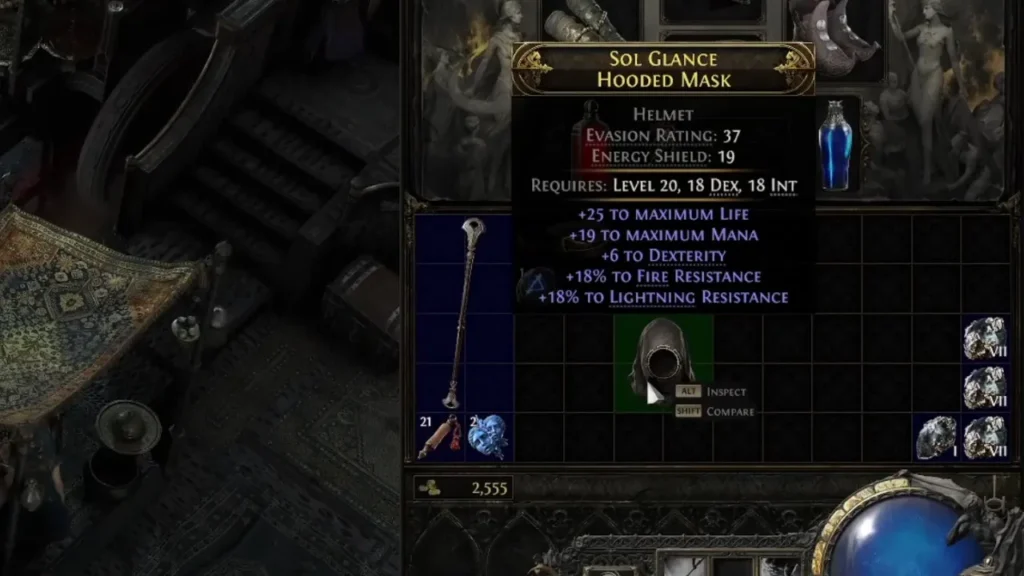
If you have socketed gear that you don't need, vendor it to build towards an Artificer's Orb which you can then use to add sockets to your existing items.
Trading
But you might find an item that you don't need, which is a bit too good to just sell to a vendor or disenchant for shards. In this case you might want to use Path of Exile 2's trading system. You can trade everything to other players (with Gold being the sole exception). For items this is done via direct player to player trading, but for currencies you can spend some Gold to list them on Faustus's Currency Exchange. The Path of Exile 2 reveal confirmed this more or less works exactly like the Path of Exile 1 version.
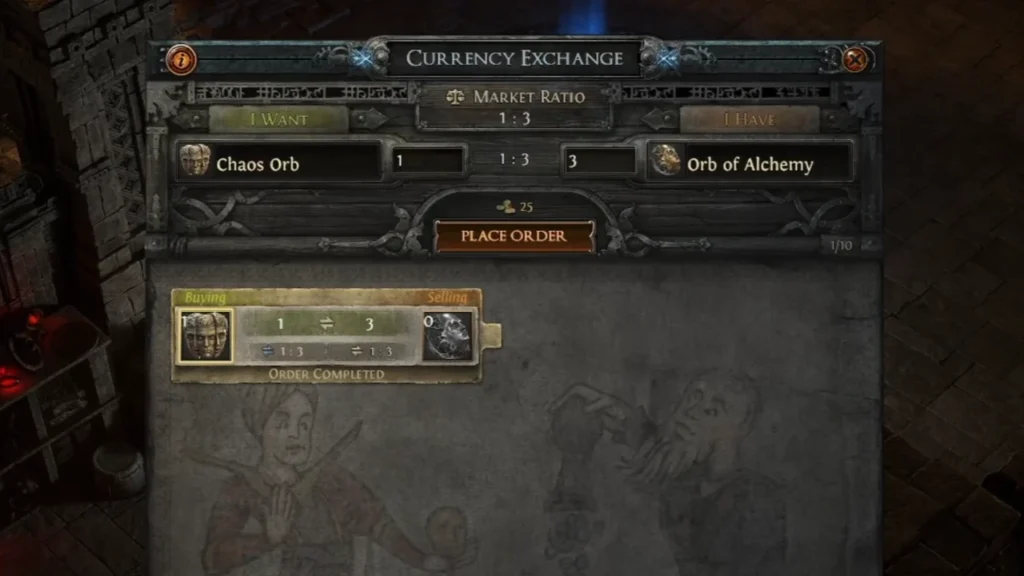
Unique Items
In addition to the craftable normal, magic, and rare items Path of Exile 2 has a variety of build-defining uniques. right now we don't know much about these but they can offer you powerful stats like the high attack speed from Quill Rain, unique skills from items like the Corpse Wade boots, or the ability to inflict special ailments on your foes. We've seen a few from the teasers but the Path of Exile 2 reveal did add a few more.
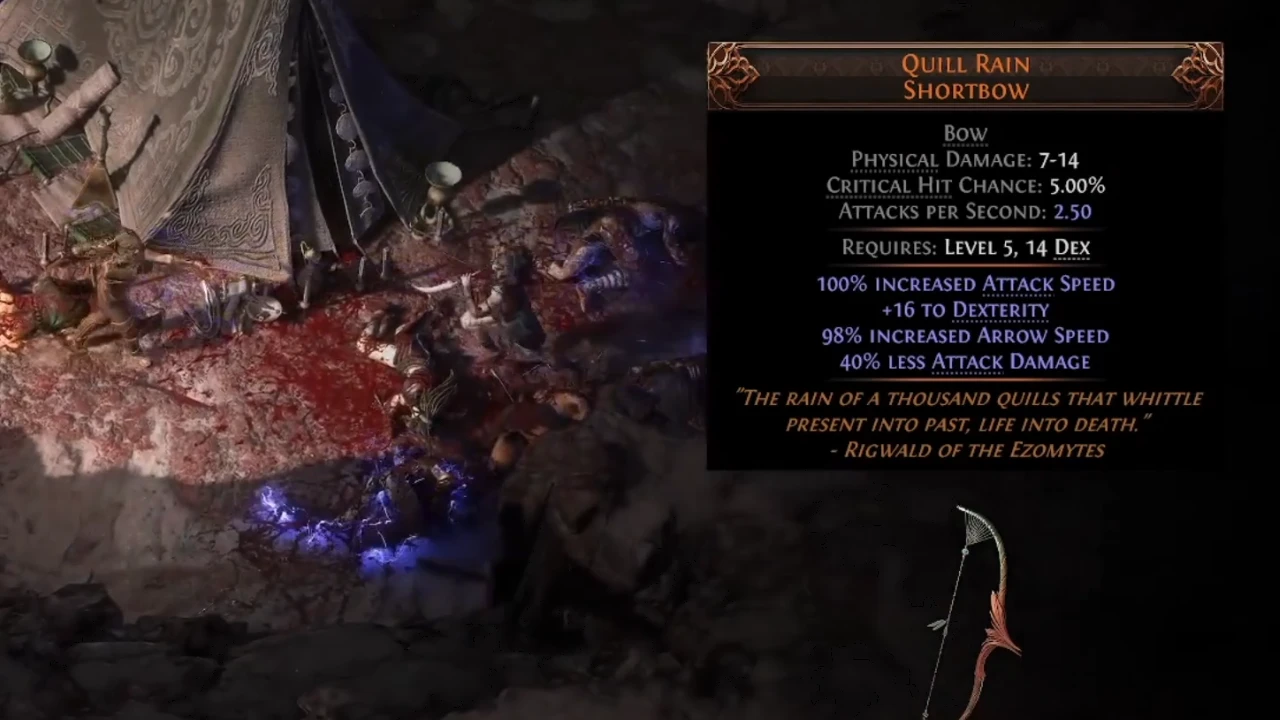
Trial of the Sekhemas
You first find the Trials of Sekhemas in Act 2, this is a series of challenge rooms each of which has a new reward. To begin this trial you must trap the soul of a Djinn into a coin and then sacrifice it on the relic altar. During the trial, each room has its own challenge which you must overcome. Select your rooms with care as they come with a variety of detrimental passive effects. These effects persist throughout the rest of the trial, slowly ramping up the difficulty.
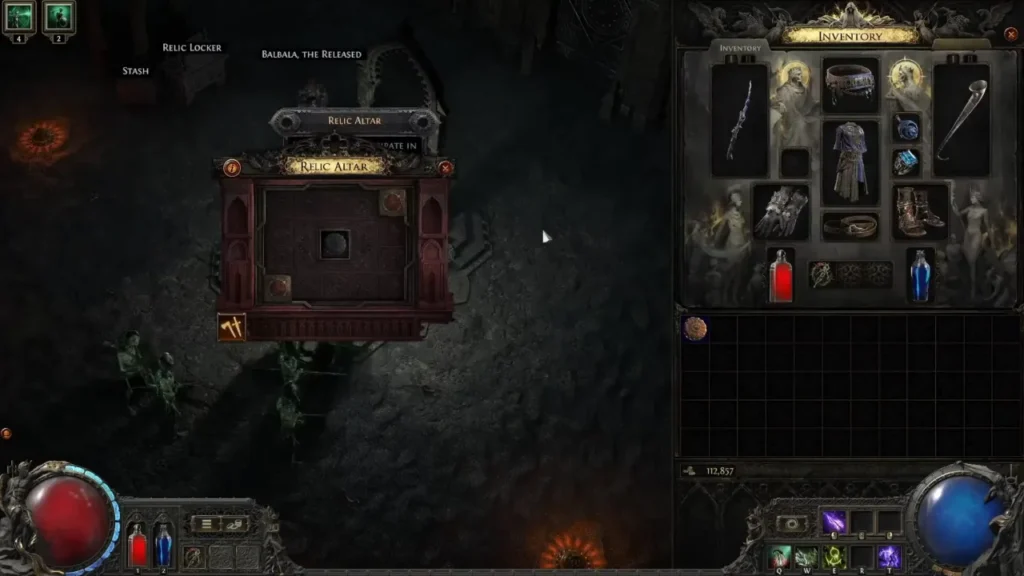
Unlike the rest of PoE 2, your primary resource is not health in the Trials of Sekhemas, instead, you use Honor. When you get hit, you lose honor and unlike health, you have no honor flask. Use Sacred Water to trade with the Djinn within the trial to recover Honor, gain boons, or remove afflictions. For those familiar with Forbidden Sanctum this is a similar mechanic.
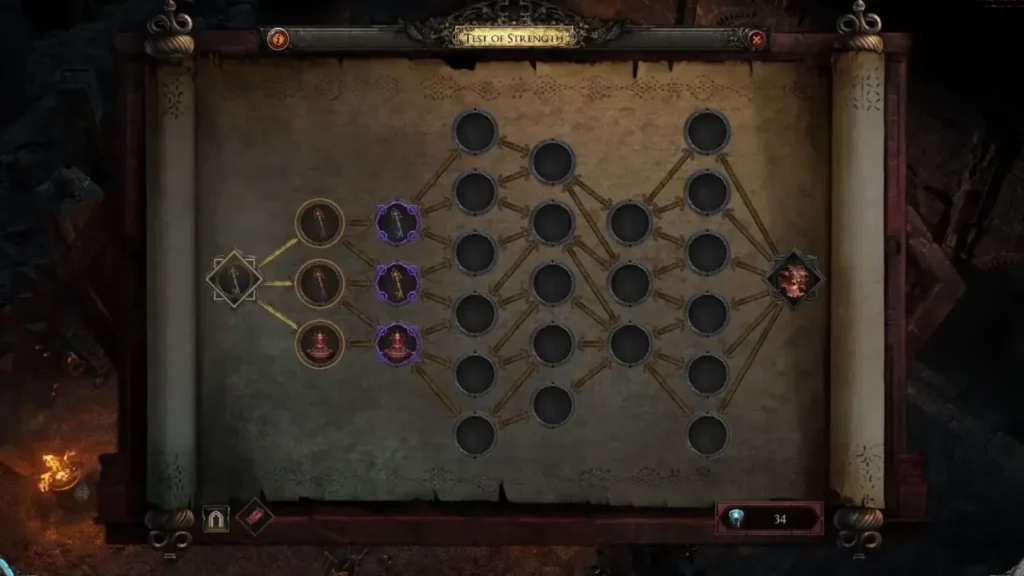
Sekhemas Trial Rooms
Different rooms have different trials, so you might have a time trial where you need to survive for the specified duration. Alternatively, you might have a trial where you need to kill a requisite number of monsters before advancing. While completing these trials, keep an eye out for nasty environmental traps. Remember, each time you get hit you lose some honor and there are very few ways to recover it.
After you complete a room, you get that room's reward. These are usually keys instead of items, you can turn the keys in for a variety of rewards after defeating the floor's final boss. This system ensures you need to complete a floor to reap most of the rewards.
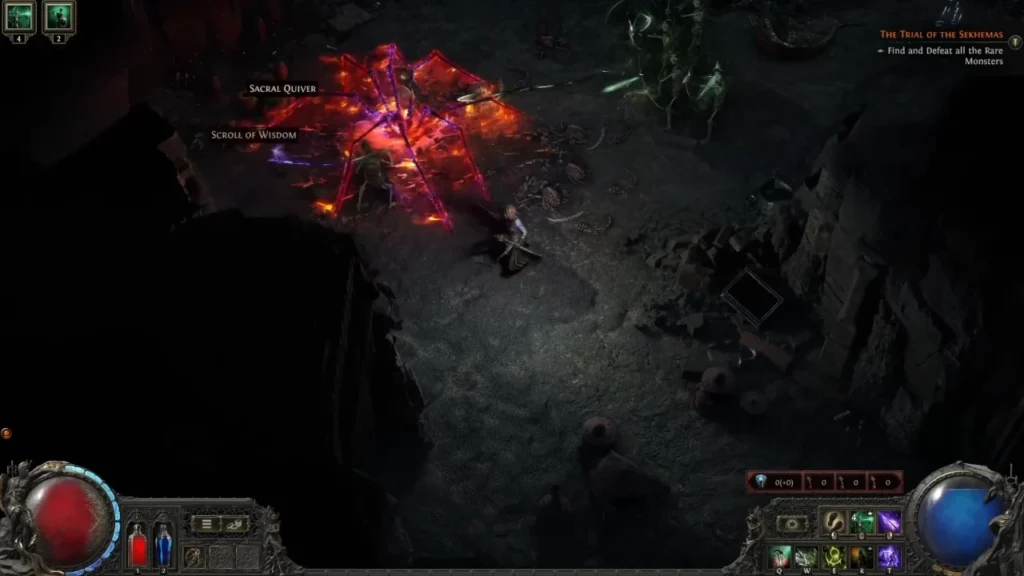
After claiming your reward, choose a new room and proceed to the next trial.
Completing the Floor
At the end of the floor one final challenge stands between you and ascension, a boss! Try to go into this encounter with high Honor to give yourself the best chance at succeeding.
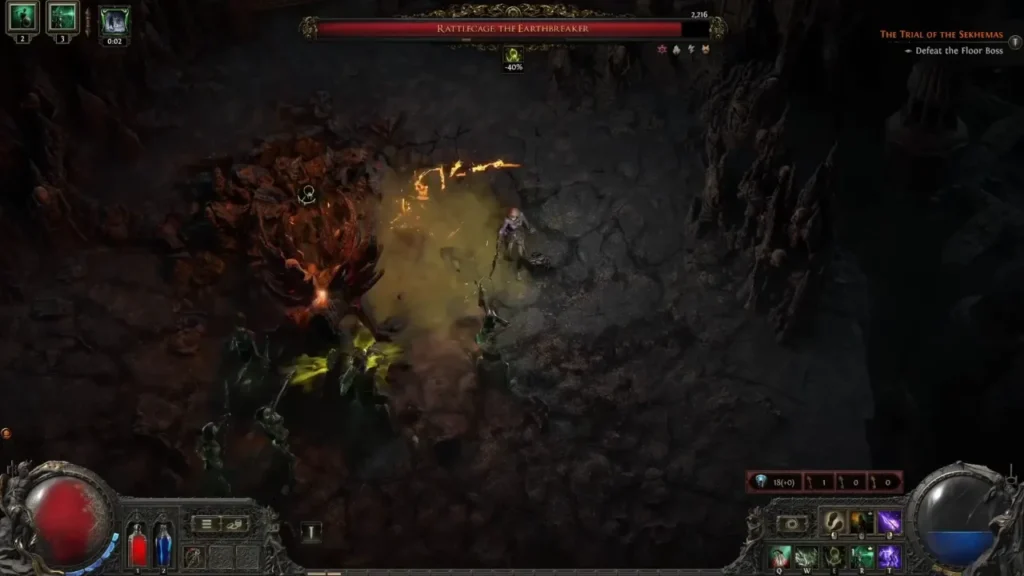
After defeating the Floor's boss, head over to the Altar of Ascendancy and select your first ascension. The first completion gets you 2 Ascendancy points, but you can gain more from completing harder versions of the Trials of Ascension later on.
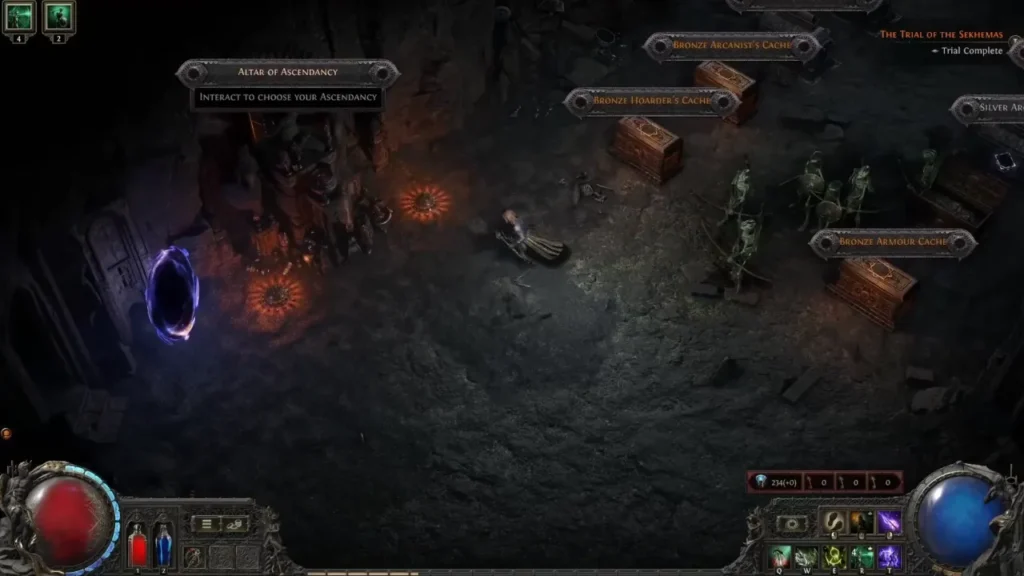
Trial of the Chaos God
The second Ascension mechanic you find is the Trial of the Chaos god, you first find this at the Temple of Chaos in Act 3. Spend an Inscribed Ultimatum to begin the Trial. Like with the Trial of Sekhemas, the Trial of the Chaos God sets you a series of consecutive challenges which you must complete to reach the end. You need to complete multiple rooms in a row without dying. Some of the options include a time trial, killing enemies, or pushing an objective.
However, this isn't so simple because the Trialmaster offers you both a reward and a tribulation. Each room, you select from 1 of 3 negative modifiers which persist throughout the run. So the Trial of the Chaos God starts relatively simple, one mechanic is easy to deal with. But with each successful room you complete, another negative modifier gets added, increasing the difficulty exponentially.
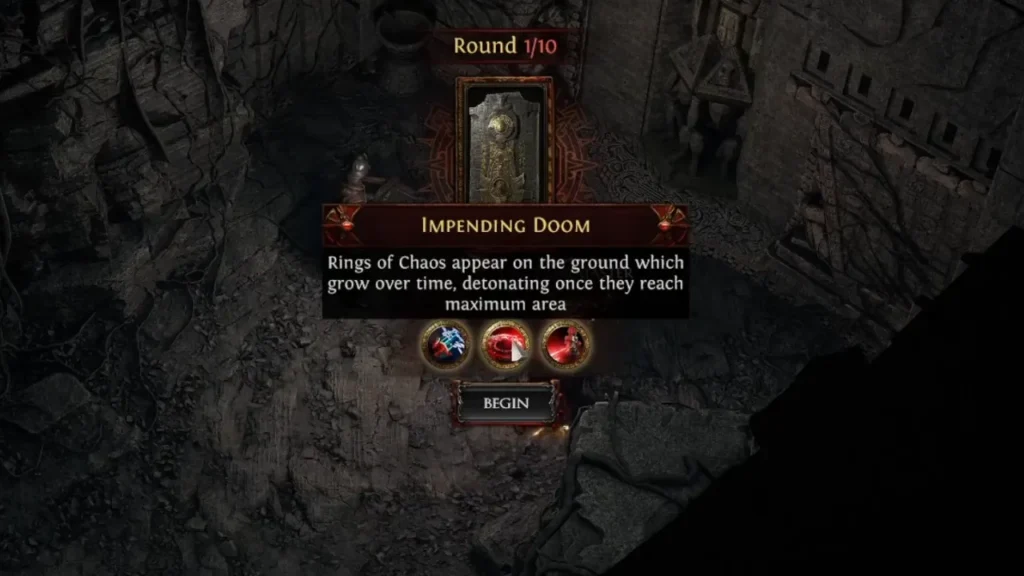
A Gauntlet of Trials
As you move to the next room, the Trialmaster offers you a new reward and adds on a new penalty. Pick your penalties carefully, if you take multiple modifiers which restrict the space in the arena or your ability to move freely it's going to be a lot harder to get around. On the other hand, if you stack a lot of modifiers that buff monsters or weaken yourself you may get an unkillable rare that brings your trial to an early end. In the early game you need to complete 4 rooms in a row to ascend, but later on you can complete many more.
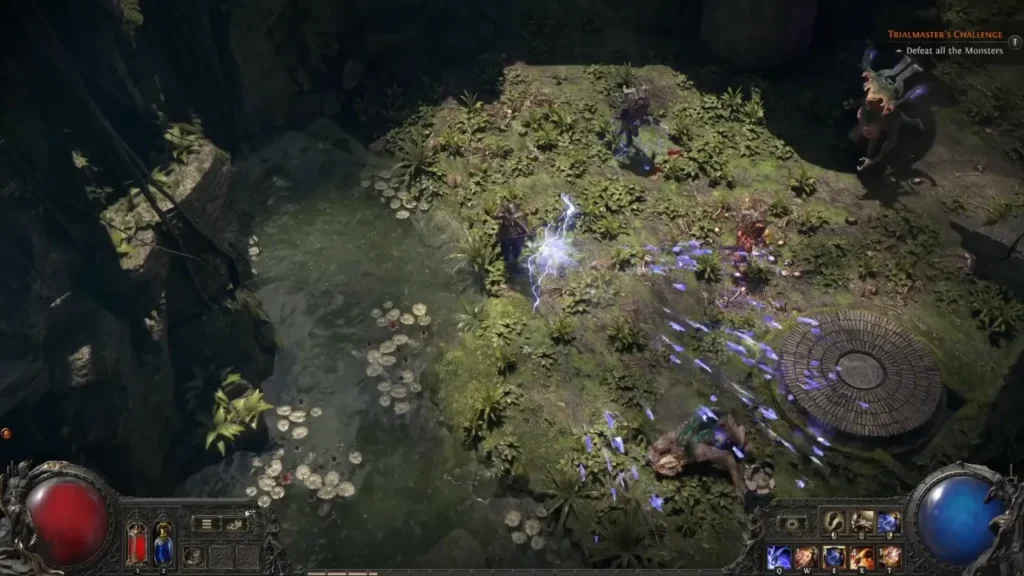
- Kill all the monsters.
- Survive the time trial.
- Escort the objective.
Completing the Trial
After 3 trials, you face a boss. The trial of the Chaos God also includes several randomized boss encounters. Their exact order and difficulty depends on when you encounter them and also what modifiers you select. Bosses in Path of Exile 2 are no joke even before you add additional modifiers so always choose your penalties with care.
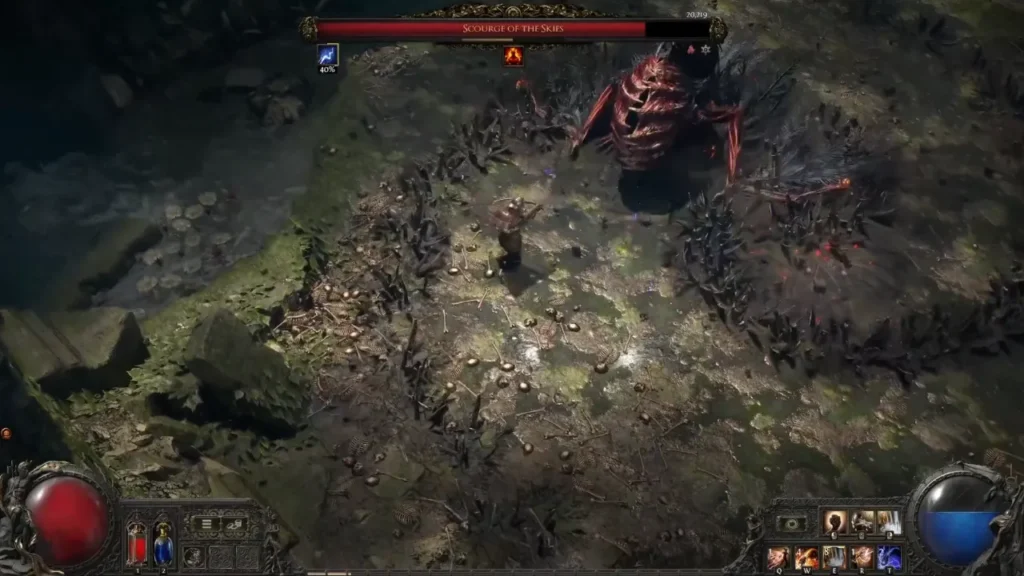
After you reach the end of the trial, or decide the risk is too great, return to the Trialmaster to collect your rewards. After taking the boss down in the 4th room, head over to the Altar of Ascendancy.
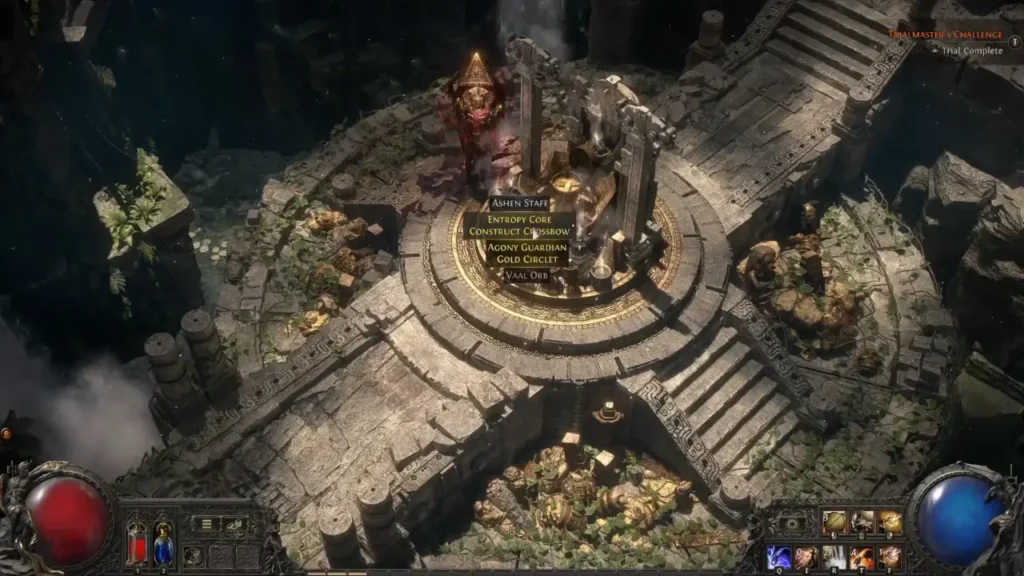
Atlas of Worlds
Path of Exile 2's campaign is broken up into 2 distinct segments. Acts 1 through 3 cover level 1 to 45. Then acts 4 through 6 are a bit shorter as you have better clear speed, ending around level 65. For the early access period, A4-6 aren't available so instead you repeat Acts 1-3 on Cruel difficulty, featuring remixed versions of the existing bosses. This means you enter Path of Exile 2's endgame around level 65.
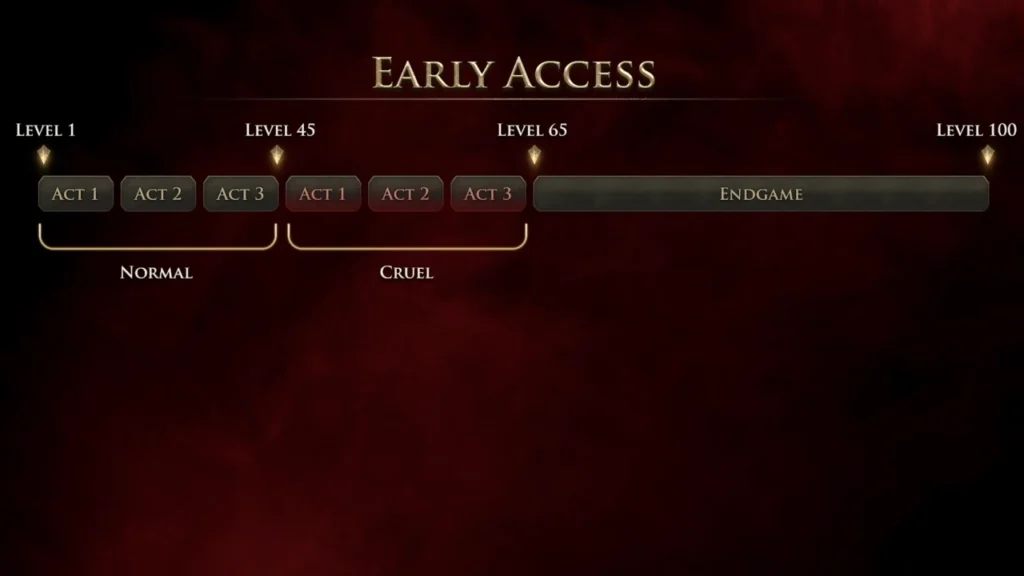
Unlocking the Atlas
Enter the Vaal Ziggurat and speak to Doryani to unlock access to the map device. This occurs around level 65 after you beat the final boss of Act 3 Cruel. Enter the Atlas of Worlds to fight the beast's corruption. This is infinite and expands in all directions. You begin from the Ziggurat and expand the map as you explore. As you complete each area you get access to the next adjacent area. New zones contain highly random monster combinations, meaning some are going to be much easier than others.
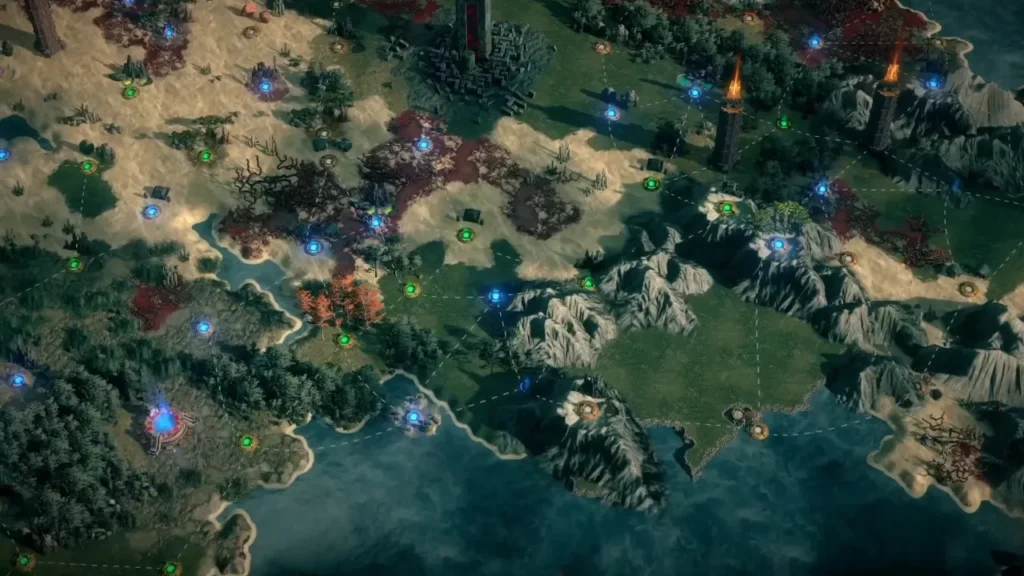
Use Waystones to explore the atlas. These are craftable and single use, but don't worry you get plenty of them as rewards for killing monsters and completing endgame activities. Each location has different monsters and may end in a challenge against a deadly boss. Initially, you drop Tier I Waystones, but higher level monsters have a chance to drop the next tier, scaling all the way up to XVI. You need to defeat all of the rare and unique enemies to cleanse the corruption and progress. But if you die, you fail the area and need to find another way around.
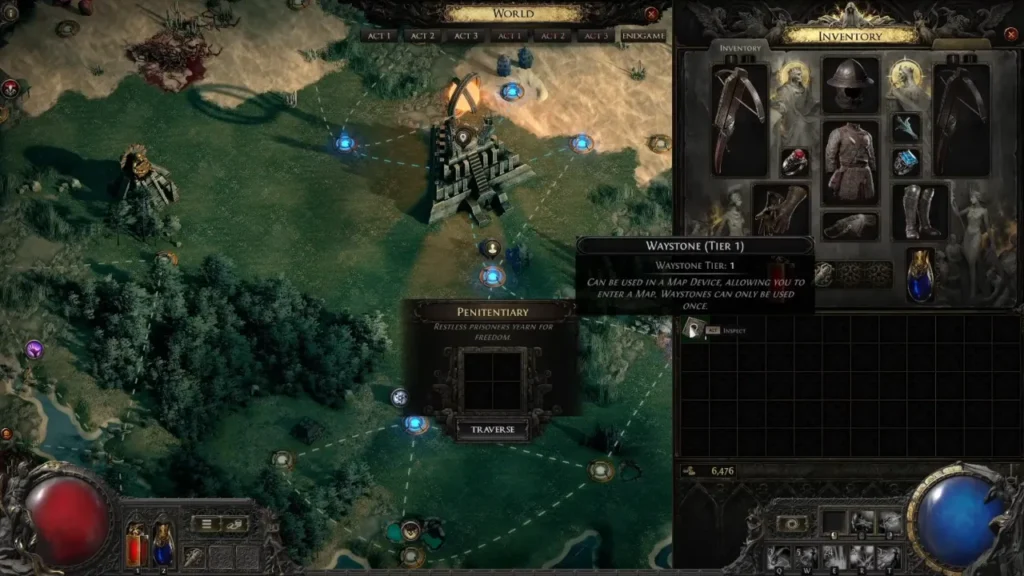
Atlas Nodes
Use the icons of each node and the symbols above each area on the Atlas to determine the challenges and rewards on offer.
- Bosses (very challenging and rewarding)
- Towers (These are Precursor Towers, they reveal the map and you can use Tablets to buff surrounding zones)
- League Mechanics (point to endgame activities, ex hand = breach)
- Beast Corruption (special zones with corrupted modifiers, these are under the effects of Beyond)
- Hideouts (your home away from home)
- Roving Merchants
- Cities (tied to each of the factions of Wraeclast)
- Special Maps like Untainted Paradise (which gives a large exp bonus)
- Realmgates / Reliquary Vaults (currently unknown)
There are a variety of content types you encounter as you explore. Usually these add an element of danger and a reward. For example, Precursor Artifacts buff nearby monsters but if you slay the guardians you can claim the buff for yourself. There are also strongboxes, these offer you a variety of loot but are always guarded by monsters. Use crafting currencies to further modify the difficulty and rewards. When you encounter a corrupted crystalline monster, slay it to gain a powerful essence. These upgrade items and add a specific affix allowing you much more control over your crafting outcomes.
Waystones and Tablets
Like with most things in Path of Exile 2 you can use a variety of currency items to craft on your waystones. Crafting a Waystone increases the danger and also increases the rewards.
- The prefixes are beneficial. This includes loot bonuses, more monsters, and much more.
- Whereas, the suffixes are penalties. Look out for modifiers that lower your defenses or prevent your build from functioning as normal.
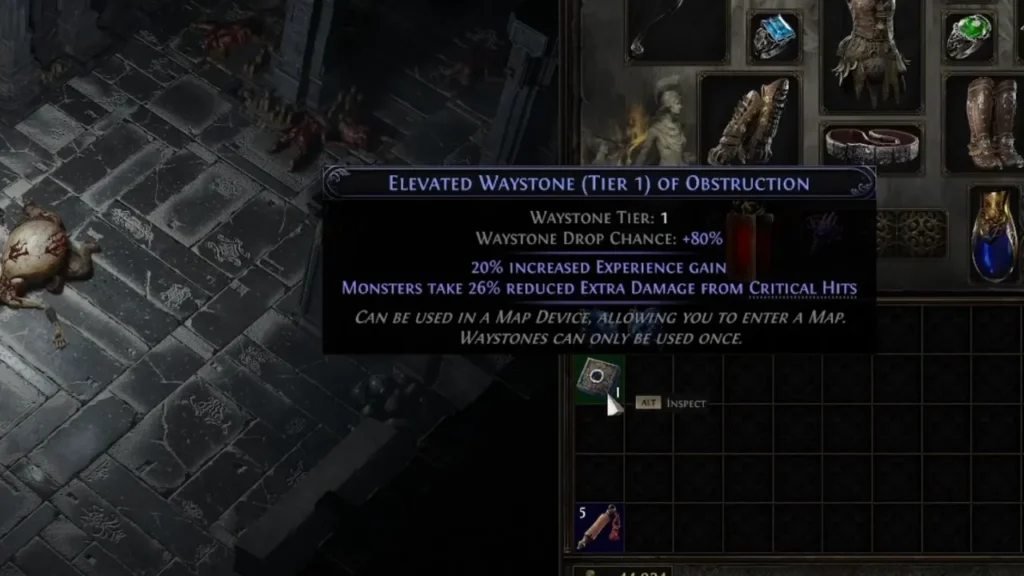
Waystones are divided into different tiers, starting with Tier I (1) and ending with Tier XVI (16). When you reach level 68 and unlock the map device you begin using Tier I Waystones. As you level up and get stronger, you can take on more dangerous Waystones. As a Waystone's tier increases, the monsters become more dangerous, the level of the area higher and the rewards more numerous.
- Tier I to V Waystones are white.
- Tier VI to X Waystones are yellow.
- Tier XI to XVI Waystones are red.
- XIV, XV, and XVI Waystones are particularly rewarding.
Tablets
In addition, as you complete league mechanics you get Tablets. These are a self-reinforcing system that allows you to experience more of the mechanics. So if you complete Breach and get a Breach Tablet, then sacrifice it at the Precursor Tower, all your nearby maps now contain Breaches that drop more Breach Tablets. Keep an eye out for towers with overlapping effects for even more juice!
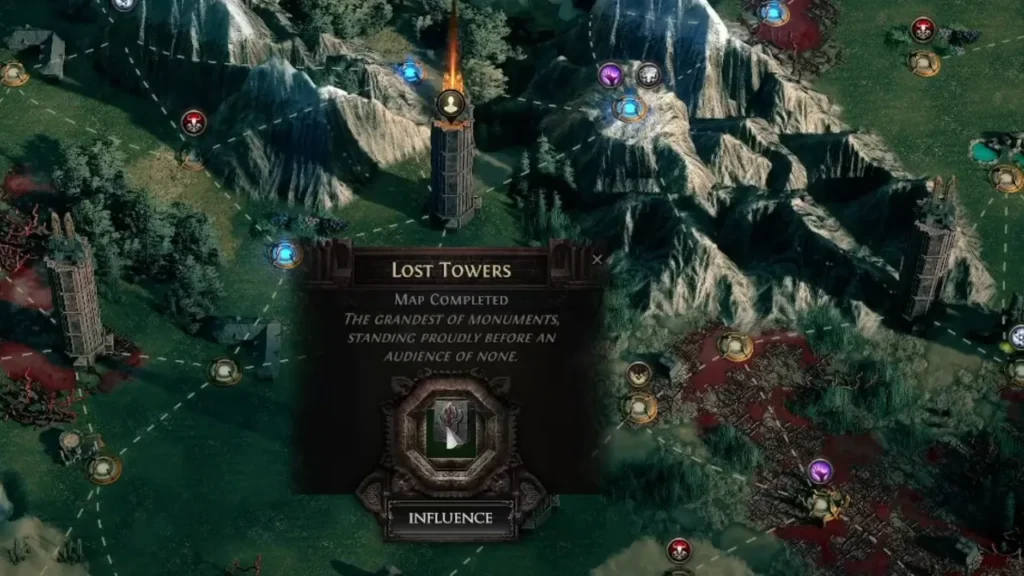
- You can also craft Tablets before activating them in a Precursor tower, to add even more bonuses to adjacent maps.
Atlas Tree
As you complete maps you gain atlas passive points. Use these to further enhance your endgame experience. There is a main tree which you progress by cleansing maps. In addition, there are trees for each of the league mechanics and also one dedicated to clearing Path of Exile 2's pinnacle boss encounters.This is also a customization system, you can increase the number of monsters or make them more rewarding.
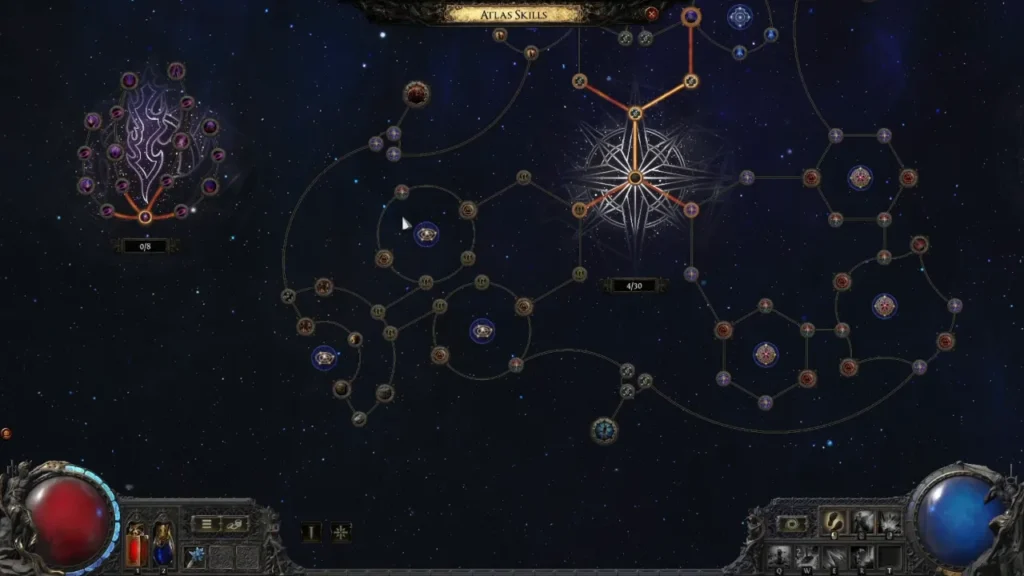
As you unlock different atlas passive points you gain more customization. However, you need to carefully choose what you want to invest in because you don't get enough points to unlock everything. Luckily each league mechanic has its own points so you don't need to pick and choose between them, but within the tree, you should specialize things based on the rewards you're looking for.
Pinnacle Bosses
There are several terrifying pinnacle bosses to challenge as part of PoE2's mapping experience. For example the combined Breachlord Xesht, We Who Are One, can be challenged via completing breaches to collect breach splinters and form a breachstone. Each of the pinnacle bosses offer their own unique items and some league specific rewards. Pinnacle bosses have 4 difficulty tiers, with the final tier being especially challenging.
There's also a pinnacle boss for the atlas itself. This is found in a special citadel which sometimes appears on your Atlas. To enter, you need to collect 3 keys from the different warring factions on the outside of the citadel. This requires you to defeat their lieutenants before taking on the uber version of a campaign boss. Should you die during this process you need to track the faction down and try again.
League Mechanics
There are a variety of league mechanics that you encounter while exploring the Atlas of Worlds. These challenge your character in different ways and each has exclusive rewards, encouraging you to try all of them as you progress your character.
Breach
When you encounter a breach, mysterious hands appear within your map. Touch them to reveal the hidden demons lurking within the world. Kill these demons as fast as possible to extend the timer and maximize your rewards. This is a mechanic that favors builds with good clear speed and doesn't require much in the way of single target damage.
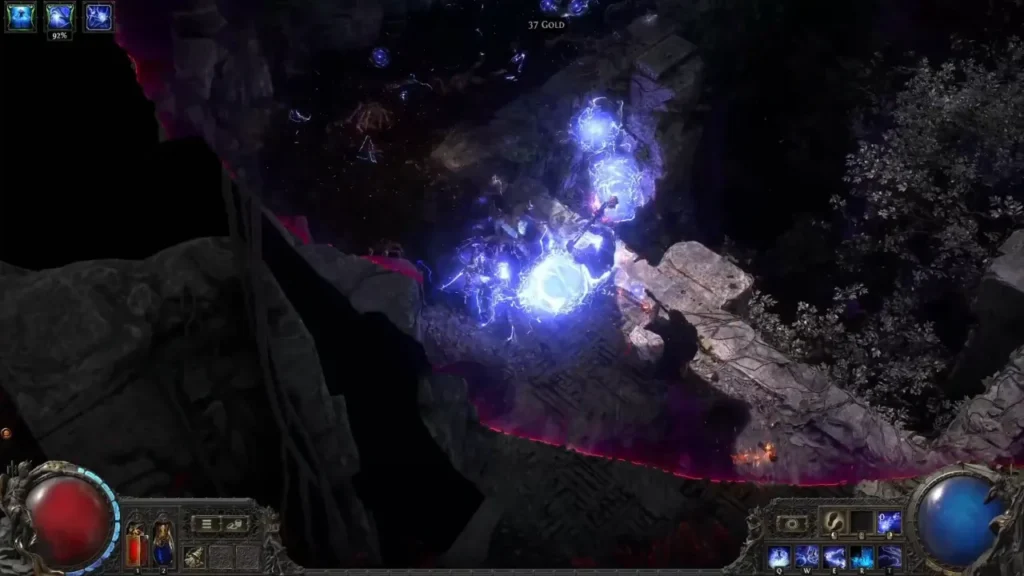
Breach Rewards
As you clear the breach you can earn a variety of rewards. First up, catalysts, which increase the quality of jewelry magnifying the potency of the modifiers. For example, you can catalyze life on your belt to give yourself a bigger overall health pool. Another reward is breach rings, these are special because they can be catalyzed up to 50% quality instead of the normal 20% quality.
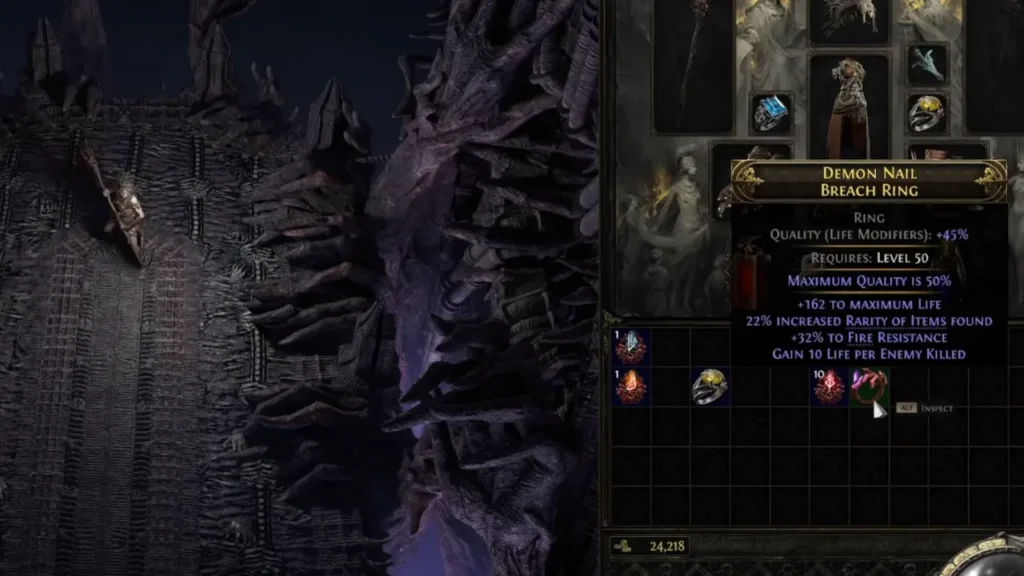
Breach Boss
If you're lucky you can find breach splinters. Collect enough of these to challenge the ultimate breach boss Xesht "We Who Are One" a dangerous pinnacle encounter that combines the powers of each of the elemental breachlords. Should you succeed, you might be able to claim one of the demon's unique items.
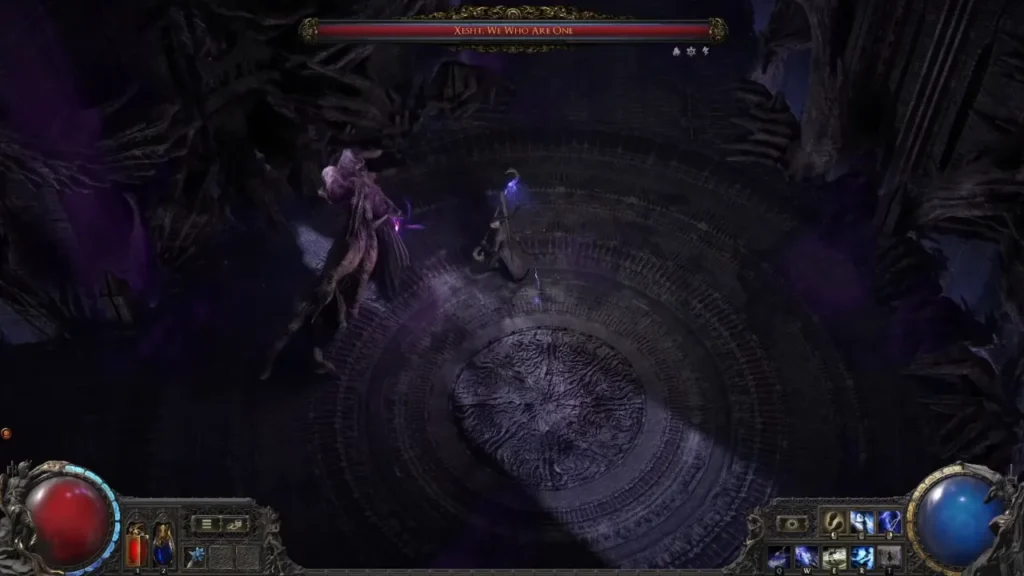
Breach Atlas Passives
There are a variety of Breach related atlas passives that increase the difficulty of the domain, add buffs to clasped hands loot, etc. Get more by defeating the pinnacle boss.
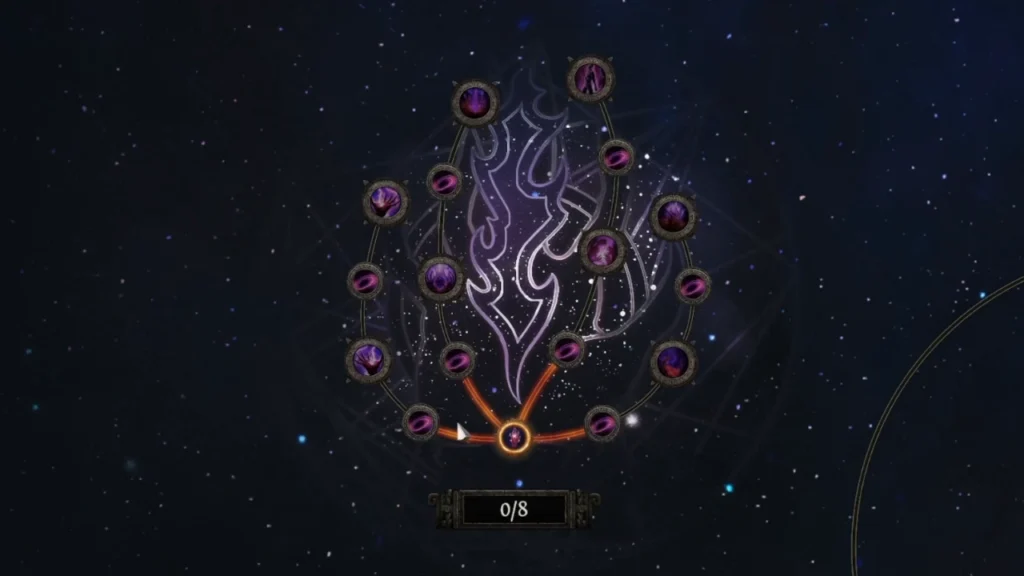
Expedition
Team up with the Kalguurans, to dig up the remnants of an ancient civilization. These remnants may be a bit angry in the aggressively undead sense of the word, after you kill them (again) remember to loot some valuable relics. You begin the mechanic by placing some explosives. Anything in the explosive radius is activated, this can be monsters to fight, chests to open or remnants. The remnants amplify the rewards for all subsequent monsters and chests in the sequence, but be warned they come with powerful downsides including immunity to damage types. Avoid remnants that make the encounter too difficult or otherwise brick your build, but try to hit as many as possible to maximize your rewards.
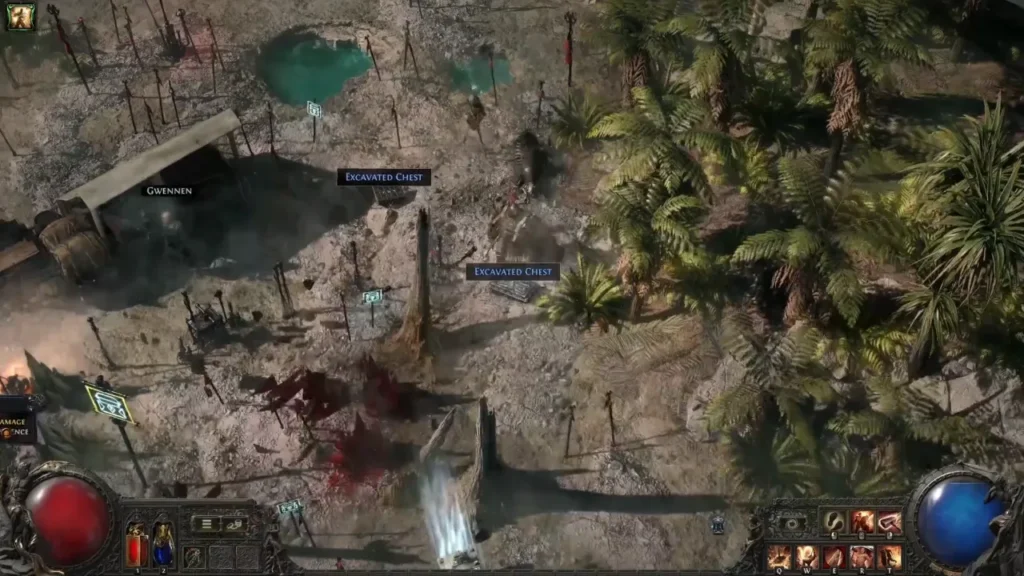
Expedition Vendors
After you complete some expeditions you can trade with the Kalguurans. Rog is particularly interesting as he offers a special form of crafting that lets you make very powerful items by enhancing the tiers of existing modifiers. Alternatively, you could choose to trade with Gwennen, Tujen, and Dannig.
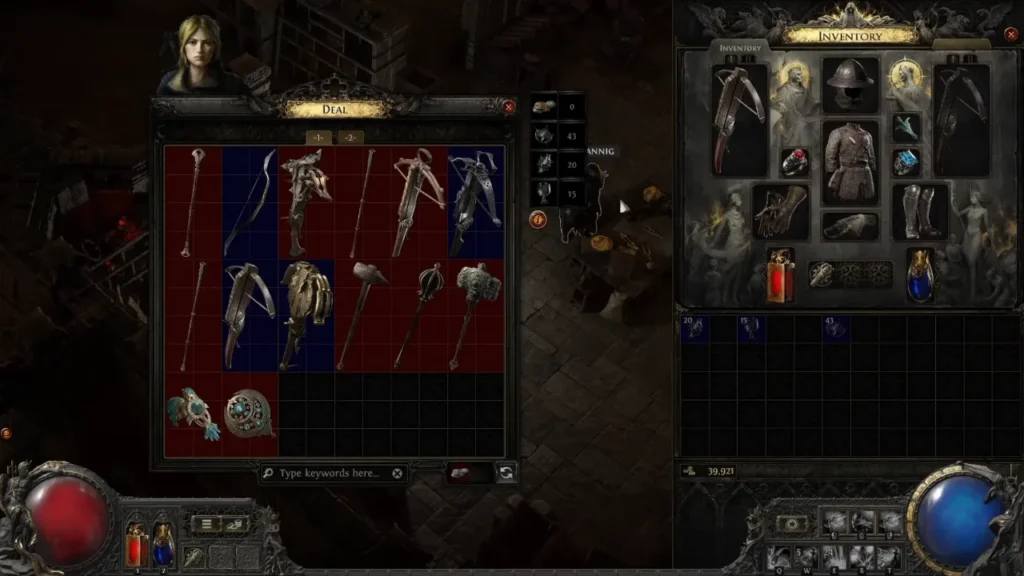
Expedition Logbooks
If you want to specialize in Expedition, consider running some logbooks. These maps are one huge expedition. Because there are more explosives and more remnants you get more rewards but this also means that the mobs which appear later in the map are far more dangerous. If you're lucky you might find one of the rare expedition bosses within the logbook.
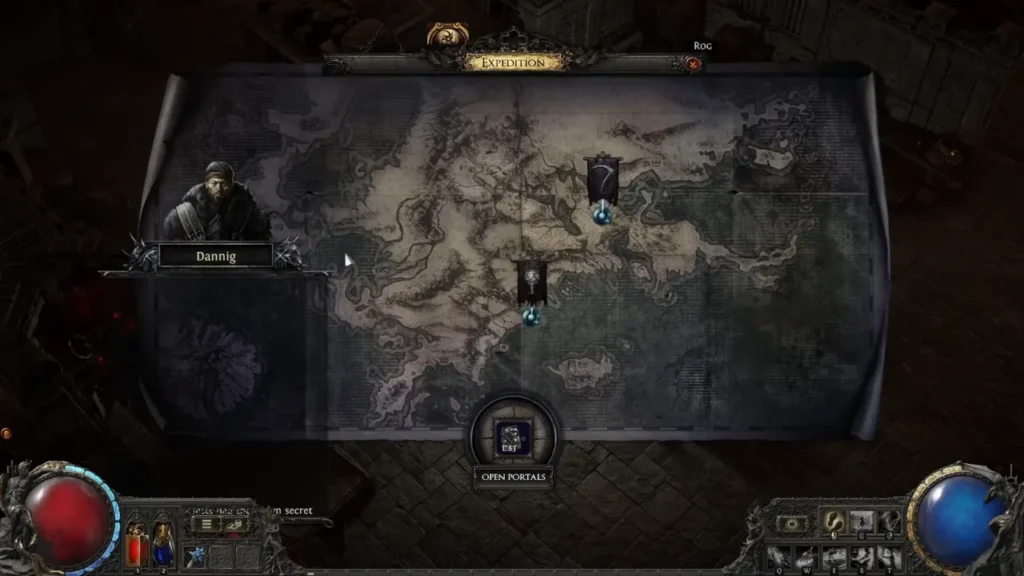
Sometimes your explosives might uncover access to Olroth, the pinnacle boss encounter for Expedition.
Expedition Atlas Passives
Completing expeditions gives you atlas passives which you can use to further enhance the mechanics. One particularly notable node is extreme archaeology, which replaces your explosive sequence with one big boom. Remember to avoid anything that hard bricks your build, but aside of that this turns expedition into one single click.
Ritual
When exploring Wraeclast, keep an eye out for rituals. These resurrect the monsters slain within them to be sacrificed. When you activate the ritual the circle closes, temporarily locking you off from the rest of the map. Slay all the monsters within the circle to end the encounter and gain tribute which you can use at the end. The monsters you kill here carry over to the next ritual in your map. One interesting thing about ritual is that when it overlaps with other league mechanics, you can resurrect some of those monsters as well.
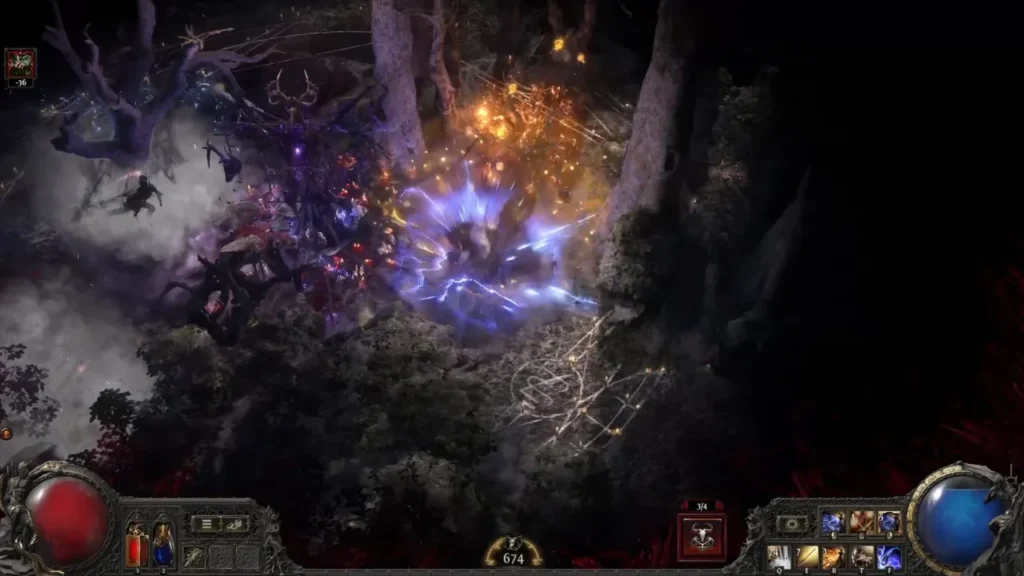
Ritual Rewards
Successfully completing rituals gives a variety of rewards. Among these the most valuable are omens. These are special items that take effect from your inventory when conditions are met. For example, the Omen of Dextral Annulment causes your next orb of annulment to only remove a suffix modifier. On the other hand, your Omen of Greater Exaltation causes your next Exalted Orb to add 2 modifiers instead of 1. These Omens grant you powerful crafting effects that can be used to make incredible endgame items!
Ritual Boss
The King in the Mists is the pinnacle boss associated with Ritual, right now we don't know much about the Path of Exile 2 version of this fight. However, if you want to prepare, maybe check out the Path of Exile 1 version of the fight to familiarize yourself with some of the mechanics he may use.
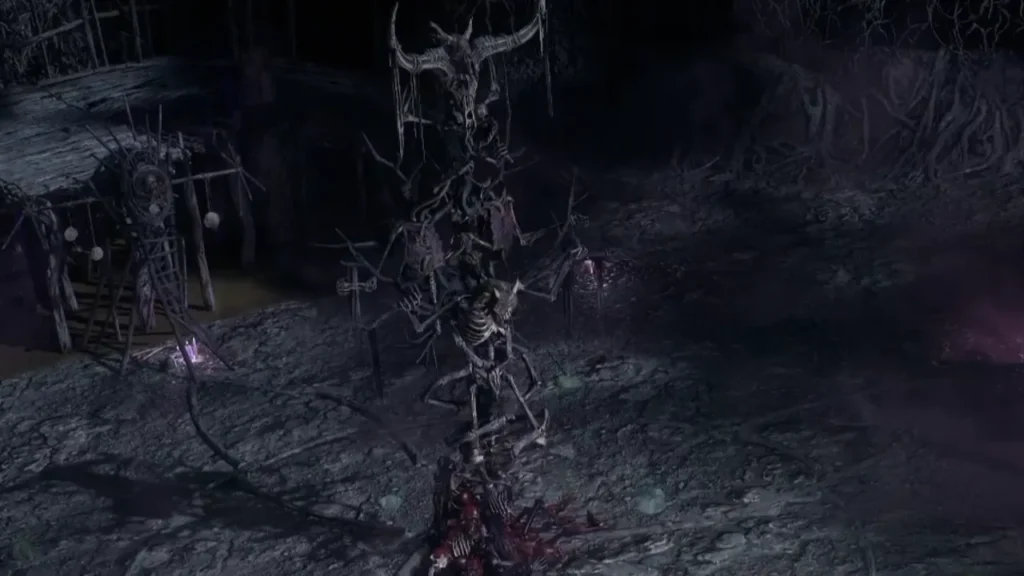
Beyond
If you like corrupting your maps, you may encounter beyond. Killing enemies close together creates portals to a world that was overrun by the scourge. These demons surge forth, aggressively invading your map. Kill them to obtain special rewards but beware if you create too many portals you might find yourself overwhelmed.
Delirium
No, that's not just a voice in your head, that's the voice of Tang'Mazu. When your map is under the effects of delirium a silvery gray fog floods your map revealing dangerous creatures and making all of the enemies within the map both more dangerous and more rewarding. Try to clear your map before the timer runs out to obtain special oils that you can use to instill your maps and items.
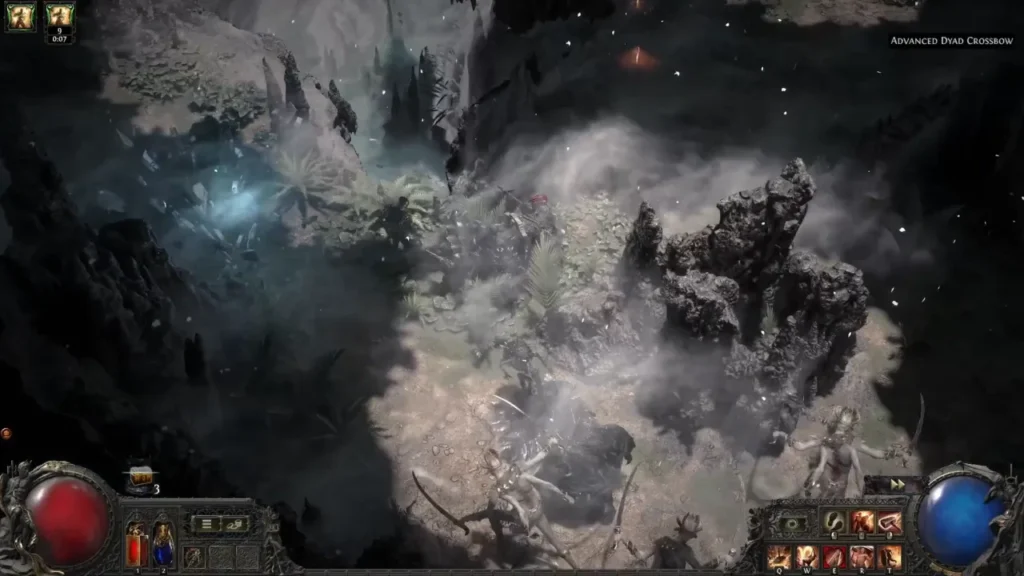
While under the effects of Delirium, you increase your rewards but the deeper you travel into the fog the more powerful your foes get. As you go deeper demonic manifestations possess the monsters and unleash new attacks.
Delirium Rewards
For example, you can use Distilled Emotions like Distilled Ire and Distilled Paranoia to instill your amulet adding the effects of one notable passive from the tree. This is handy because you can use it to grab something your class normally can't reach or save travel points on some sub-par nodes. Alternatively, you can use them to instill maps adding layers of delirium and increasing the rewards
Delirium Simulacrum
This is the pinnacle encounter for Delirium, you fight waves of increasingly difficult monsters. Each wave gives more loot but ramps up the danger. If you go deep enough you might encounter Omniphobia or Kosis.
Endgame Sekhemas
The Trials of Sekhemas appears in the endgame as well and offers unique rewards in the form of jewels, you can get some Jewels anywhere but the Trial has a few that are exclusive. These are socketed into your passive skill tree and provide a variety of effects. While you still use Honor, your health and defenses do provide scaling bonuses within the Trials, making it easier for powerful exiles to become a Sekhemas.
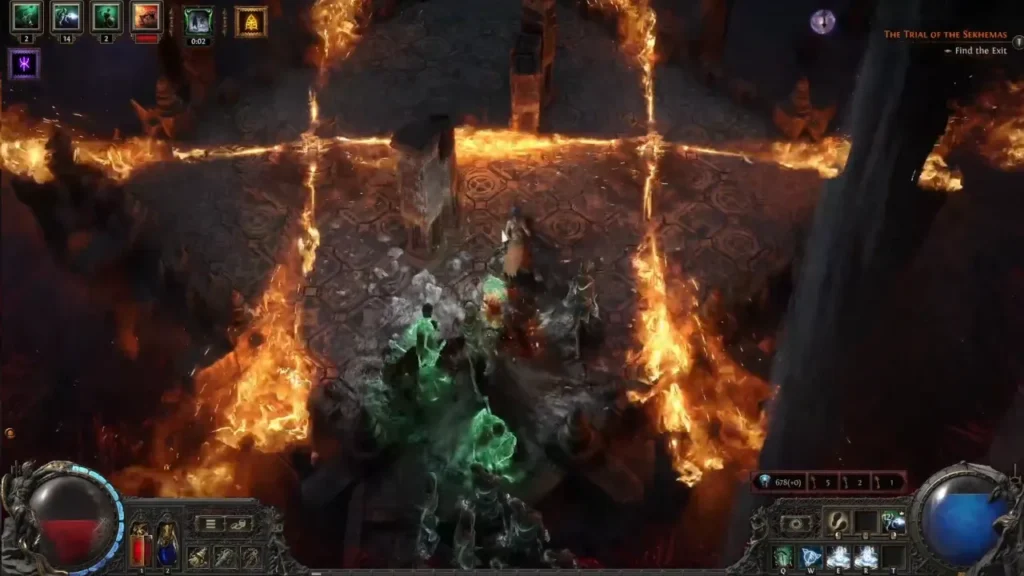
Some jewels provide affixes like you find on items. But others are more interesting, and modify all of your passives within a radius. This can add a new effect, make the passives more potent or completely transform them into something else. Like with many other things in PoE2 you're able to craft jewels so save your currencies and prepare to roll! While completing the endgame version of the Trials of Sekhemas explore 4 floors, fight more bosses and keep an eye out for powerful unique jewels.
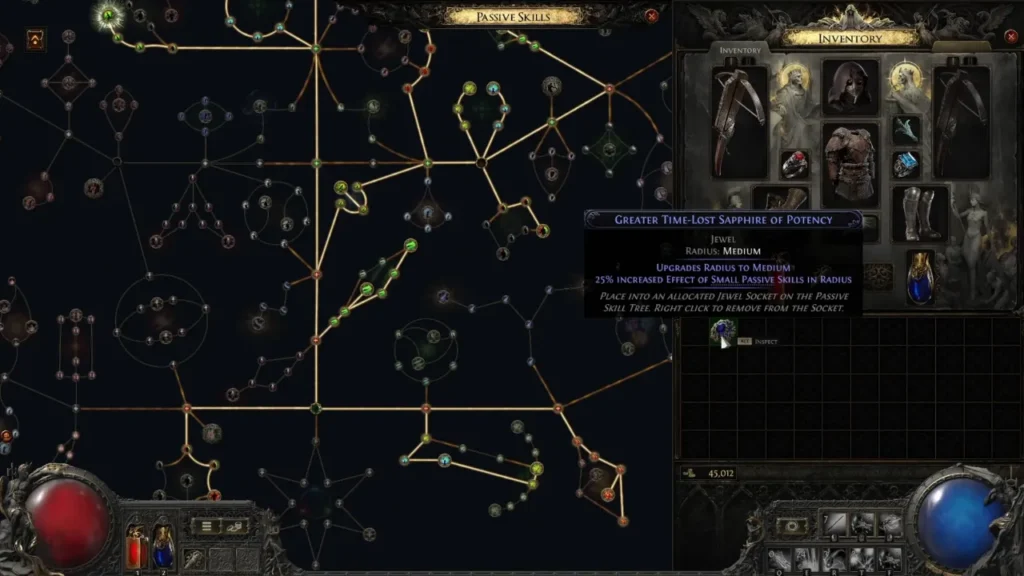
Relics
Relics are the metaprogression system for the Trials. These are craftable items which give persistent effects. As you progress through the trials you unlock more relic slots. Use these to boost your Sacred Water drops, or make it easier to deal with difficult penalties.
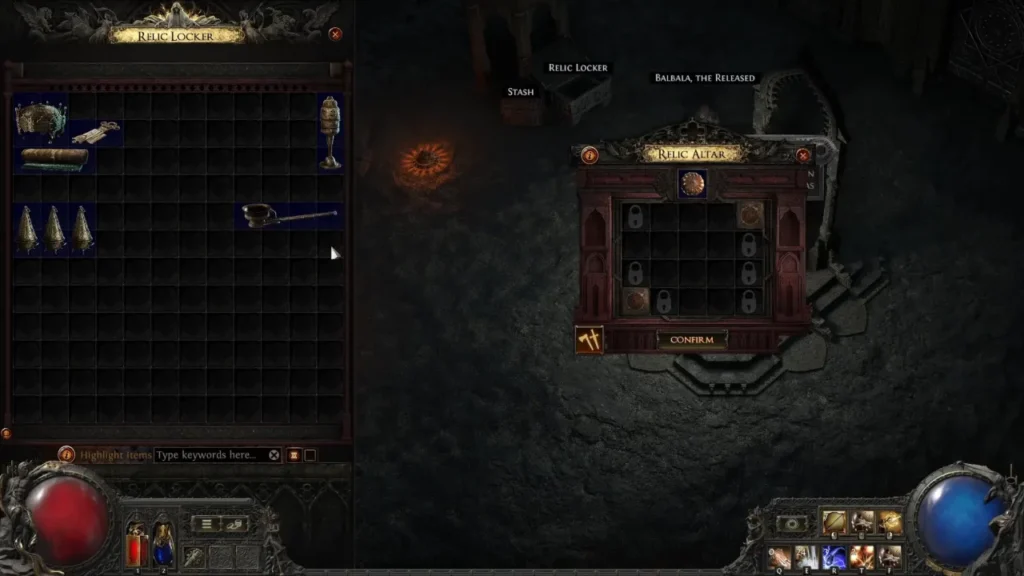
Endgame Chaos Gods
Endgame Inscribed Ultimatums go up to 10 waves for even more rewards. This is a great way to get Vaal Orbs to fish for powerful corruptions on your gear. Inscribed Ultimatums are craftable, some of the mods make the trial more dangerous, and others allow you to gamble currency. You might wager 13 Exalted Orbs, losing them should you fail the trial or gaining 26 if you triumph.
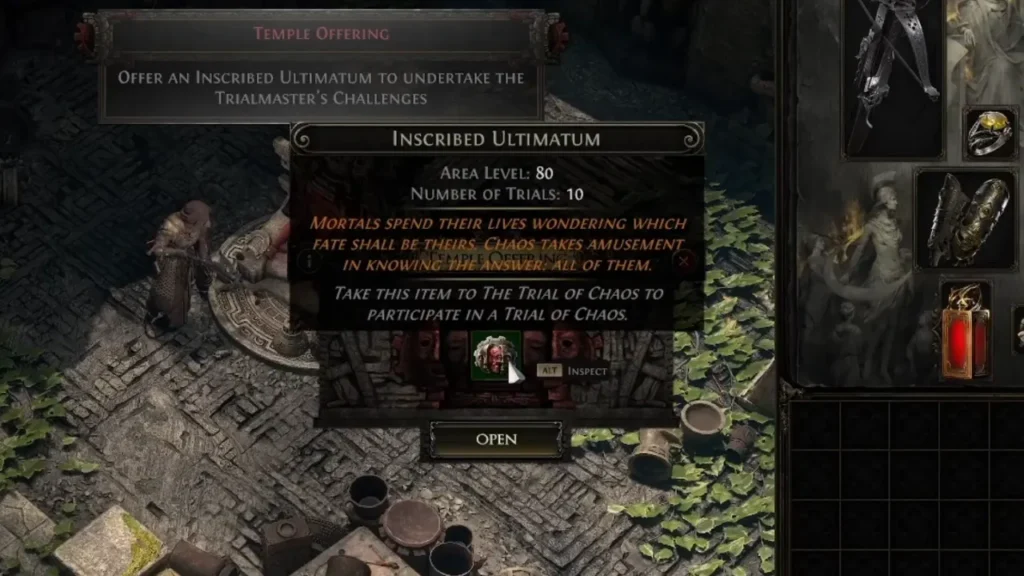
Sockets and Soul Cores
Adding a socket is one of the corruption outcomes, but there's a significant risk that you destroy your item but lets you get +1 socket above your item's normal limit. Finding gear with sockets, and filling them with beneficial runes or soul cores is a great way to become more powerful in the endgame, but don't worry about this too much during the campaign as you're unlikely to find these things reliably.
Soul Cores are a special type of socketable item exclusive to the Trial of the Chaos God. These offer more powerful bonuses assuming you're able to gamble your way through the ancient trial.
Trialmaster Boss Fight
Last but not least, the Trialmaster is a pinnacle boss encounter associated with the Trials of the Chaos God. We don't know much about the fight but expect some excellent voice lines for the sassmaster's return.
Pinnacle Encounter
Finally, there is a Fortress that appears within your Atlas of Worlds, it's surrounded by an enormous maze. This is where the Atlas's pinnacle boss is found, to access it you need to explore nearby cities. Track down 3 faction leaders to obtain their unique keys and combine these to enter the Fortress.
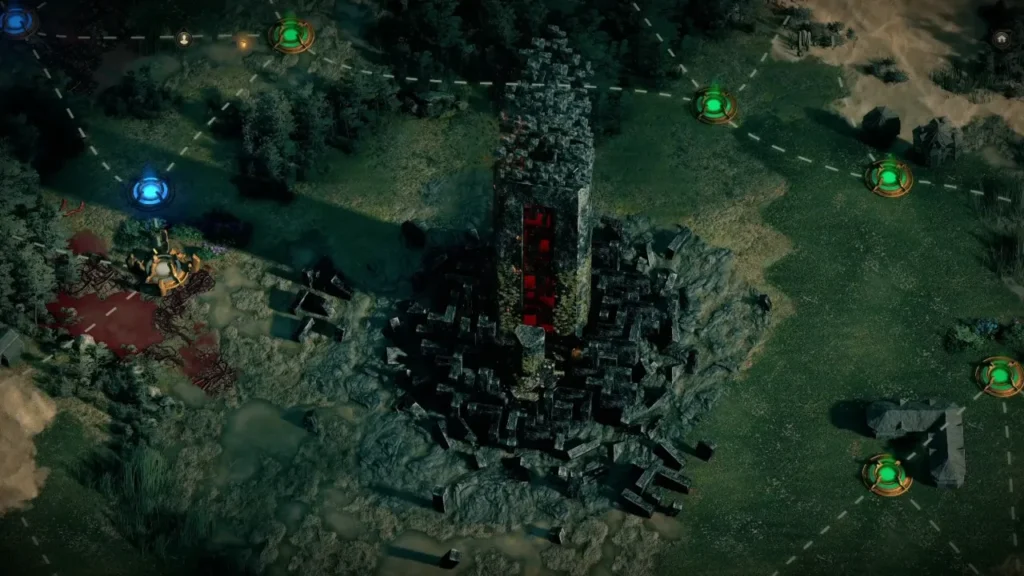
You need to defeat 2 Lieutenants before you can access the faction leader. Each faction leader is the uber version of a boss from the campaign. You must defeat both the lieutenants and the faction leader without dying, otherwise they move on to another nearby city and need to be found once again. If you're able to enter the fortress and clear the challenge within, unique rewards await you and of course, there is a special passive skill tree.
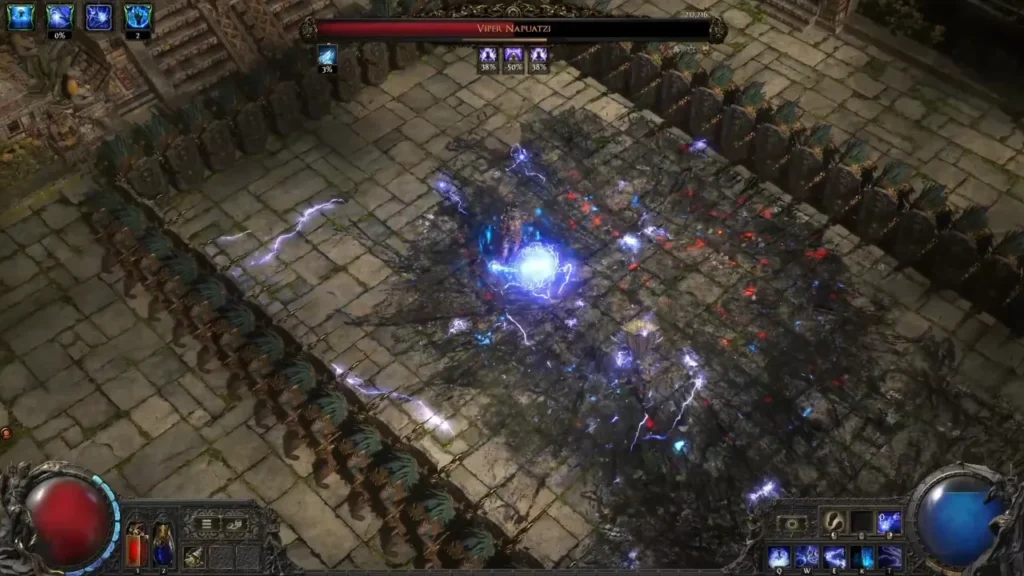
Supporter Packs
The Path of Exile 2 early access supporter packs were also covered in the reveal. The packs start at $30 which gives you access on December 6. Additionally, anyone who spent at least $480 previously, automatically gets access. However there are several other supporter packs available and higher tiers include physical goods.
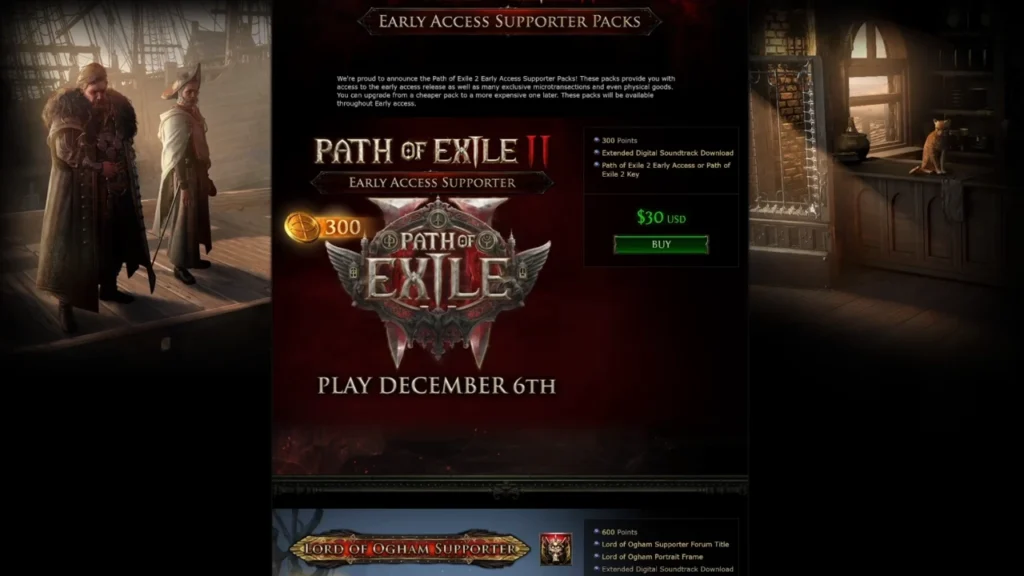
ZiggyD Q&A
ZiggyD sat down with Mark Roberts and Jonathan Rogers to discuss the Path of Exile 2 reveal, endgame, future content, and the general design philosophy. Here are a few quick thoughts from the Q&A:
- Atlas: Randomized, exploration focused. Towers reveal nearby maps. Boss maps ~25% of the time for meaningful fights.
- Crafting: Early game accessible, more currency drops, tools like Omens and Soul Cores replace crafting bench.
- Item Rarity: Improved mods and currency quality. Fewer, better drops.
- Economy: Trade system and Currency exchange from PoE1 continues. Solo self-found more viable with increased crafting opportunities.
- Death Mechanics: Checkpoint respawns in campaign. Death ends maps in Endgame.
- Multiplayer: Revive times increase per death. No revives in maps.
- Leagues & Content: Legacy mechanics integrated. Challenge rewards/private leagues coming post-launch.
To read over the full Q&A, check out our Path of Exile 2 Reveal Q&A post!
Video Summary
If you want a quick TL:DR check out this video:
Credits
Written by: Tenkiei